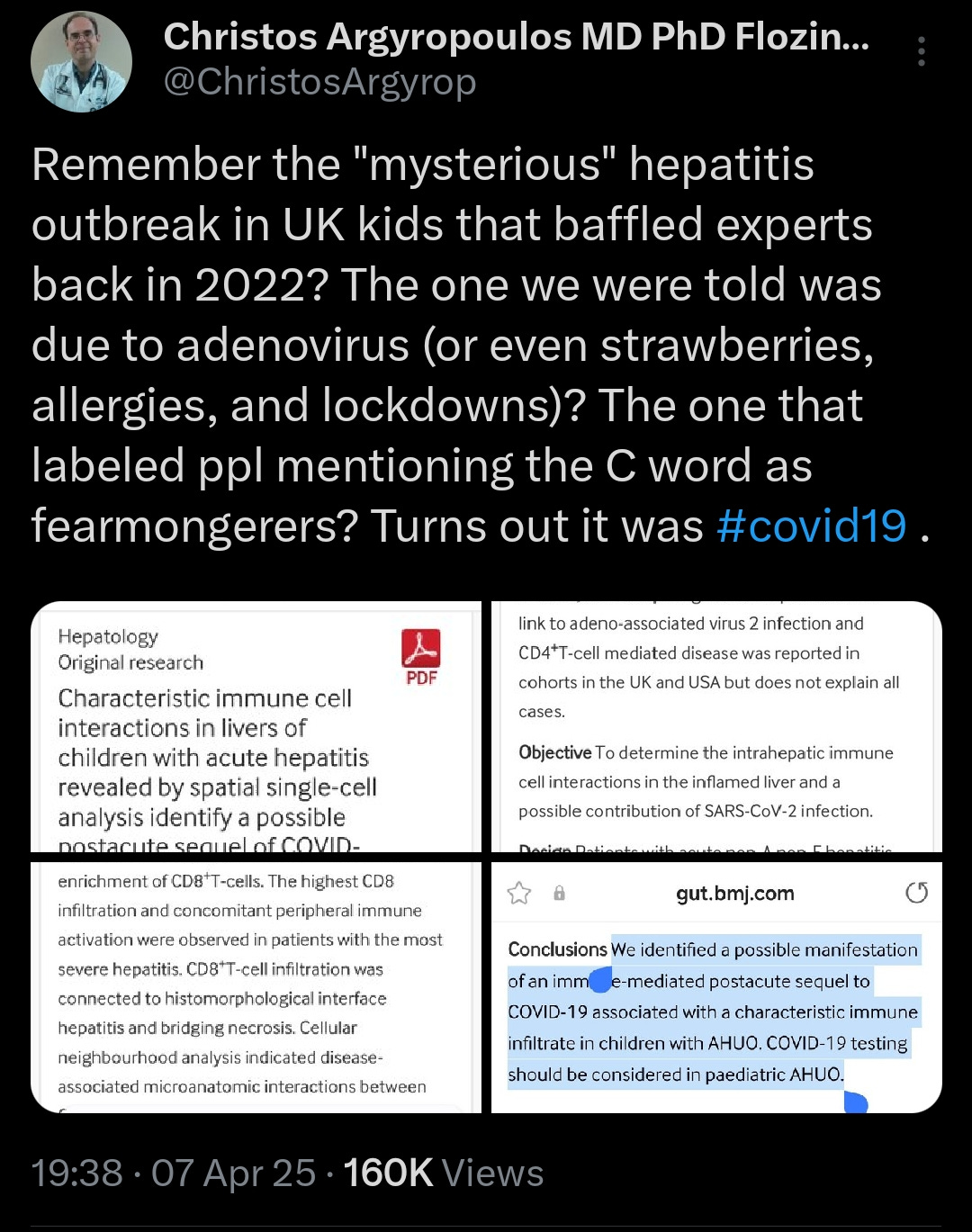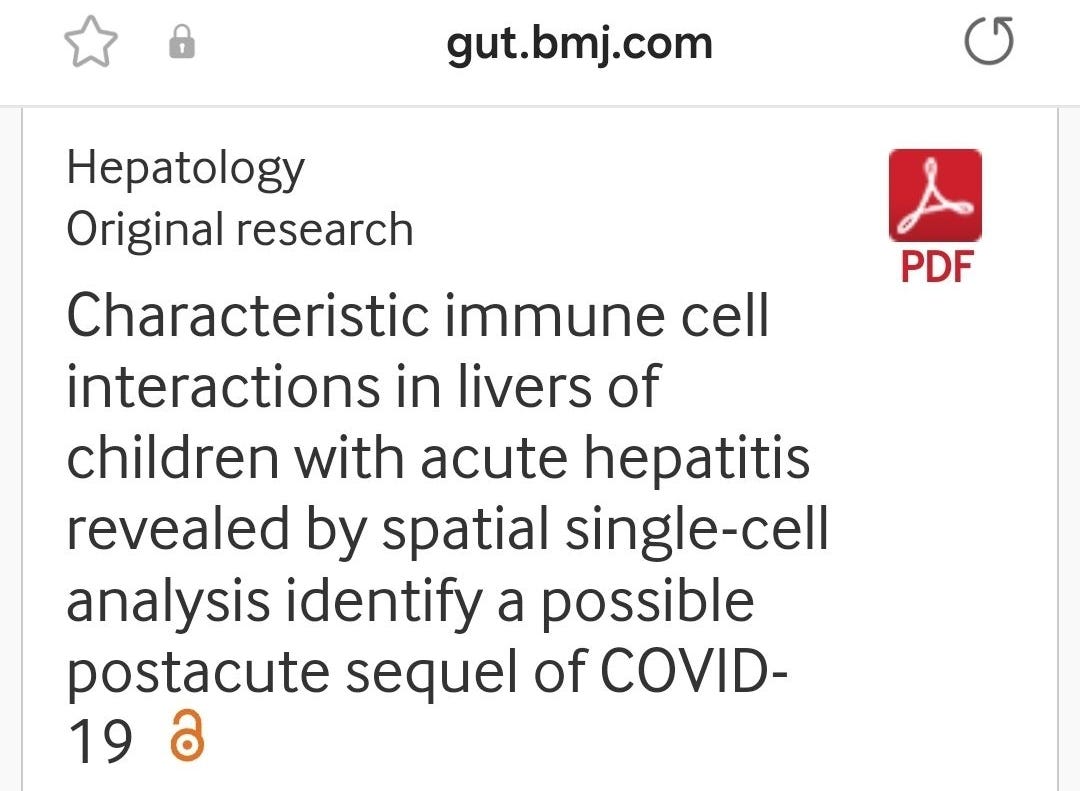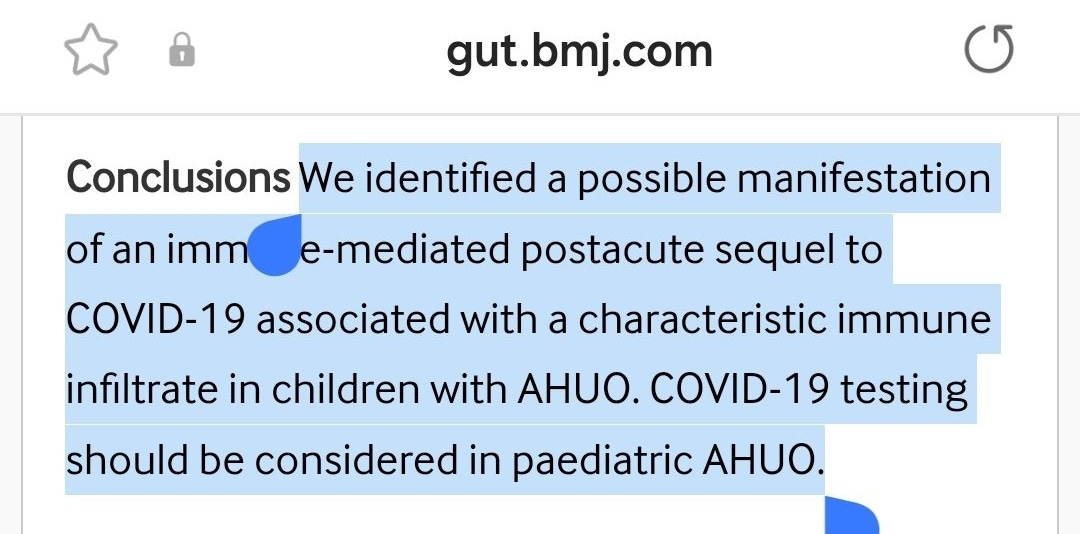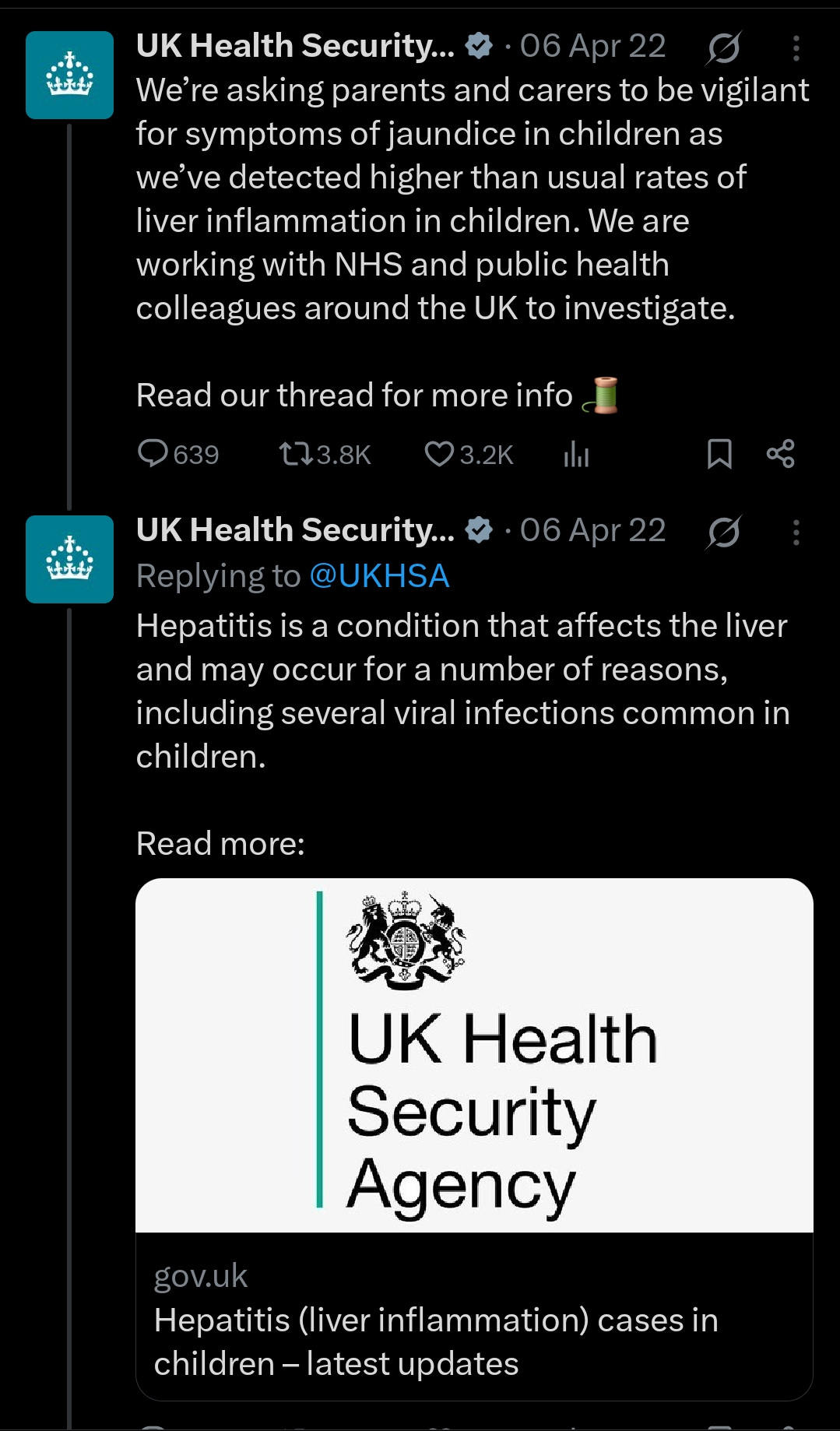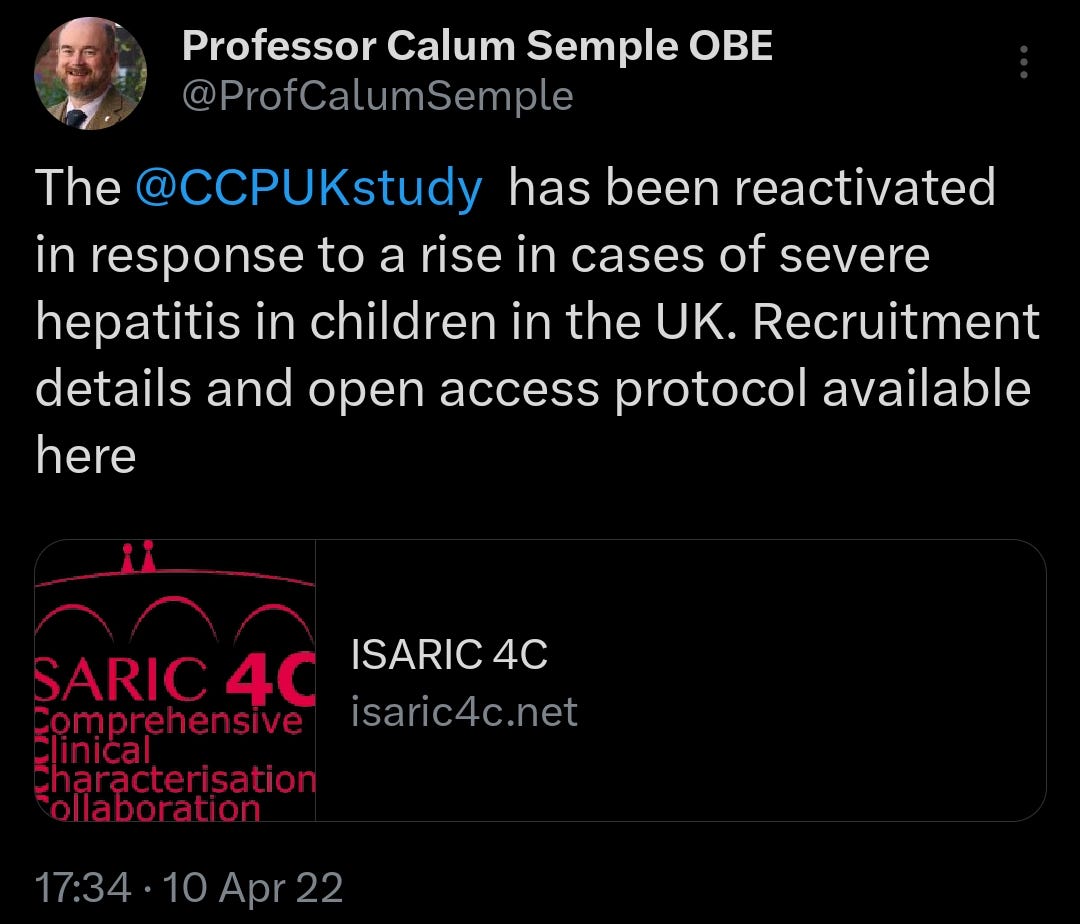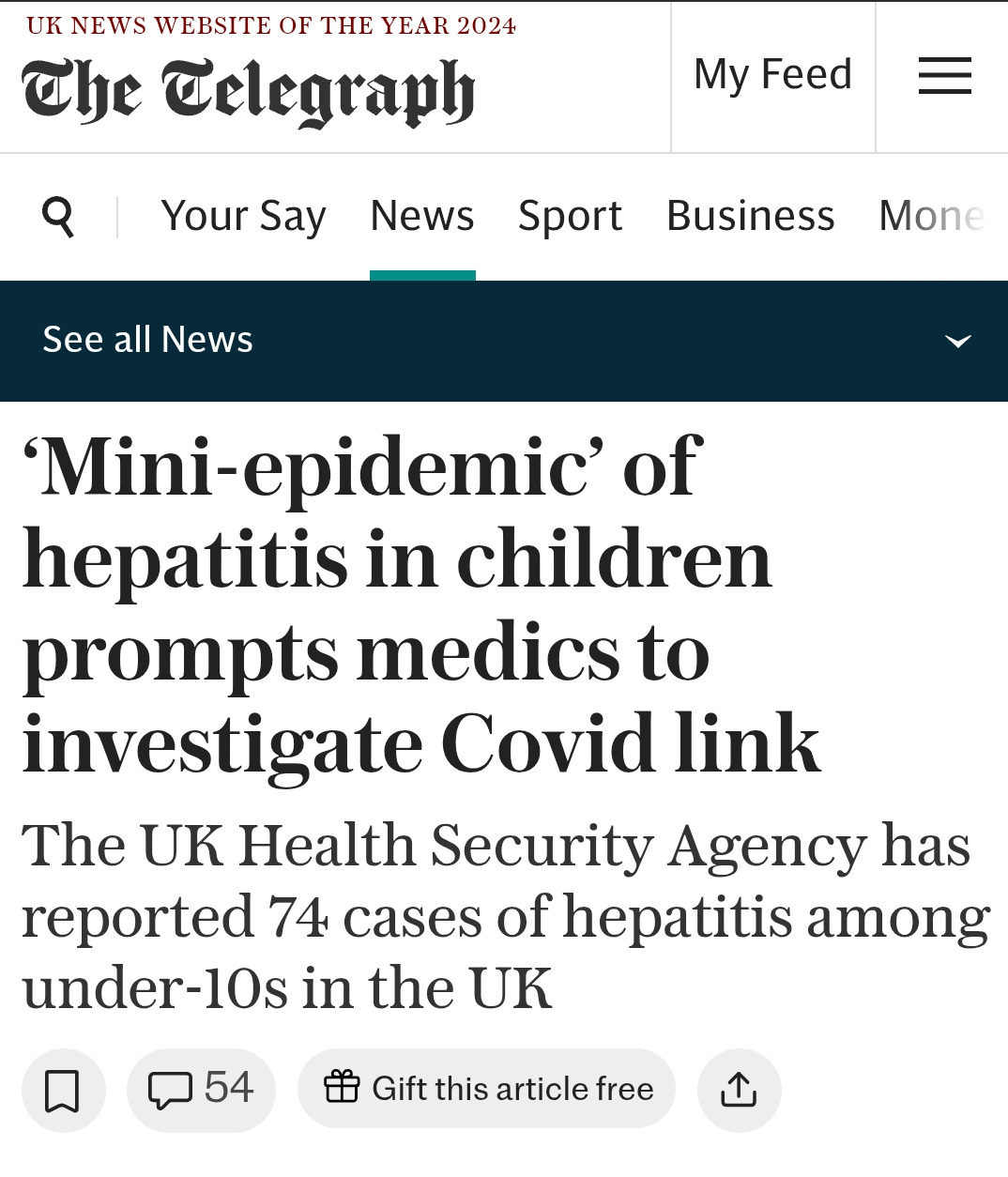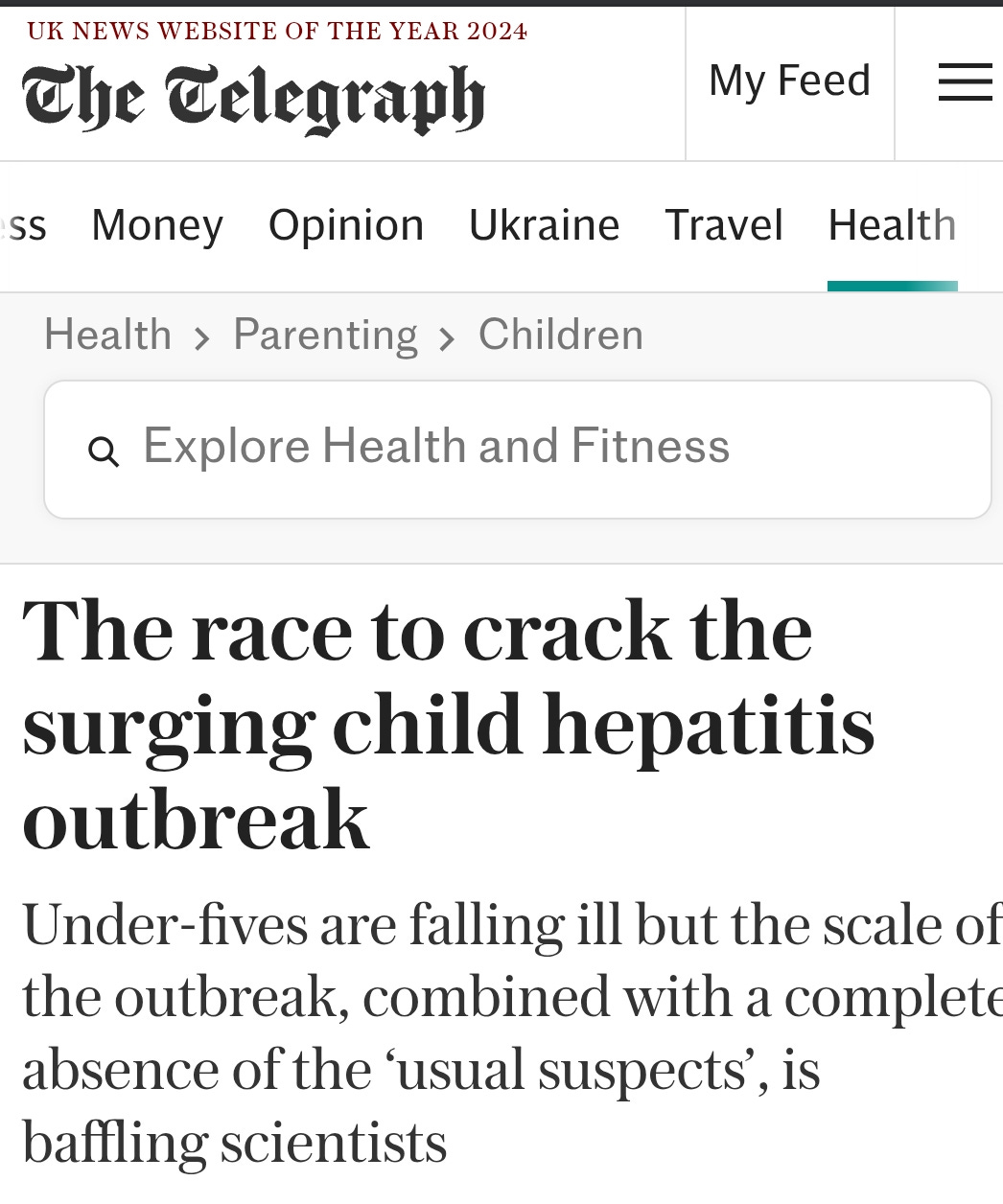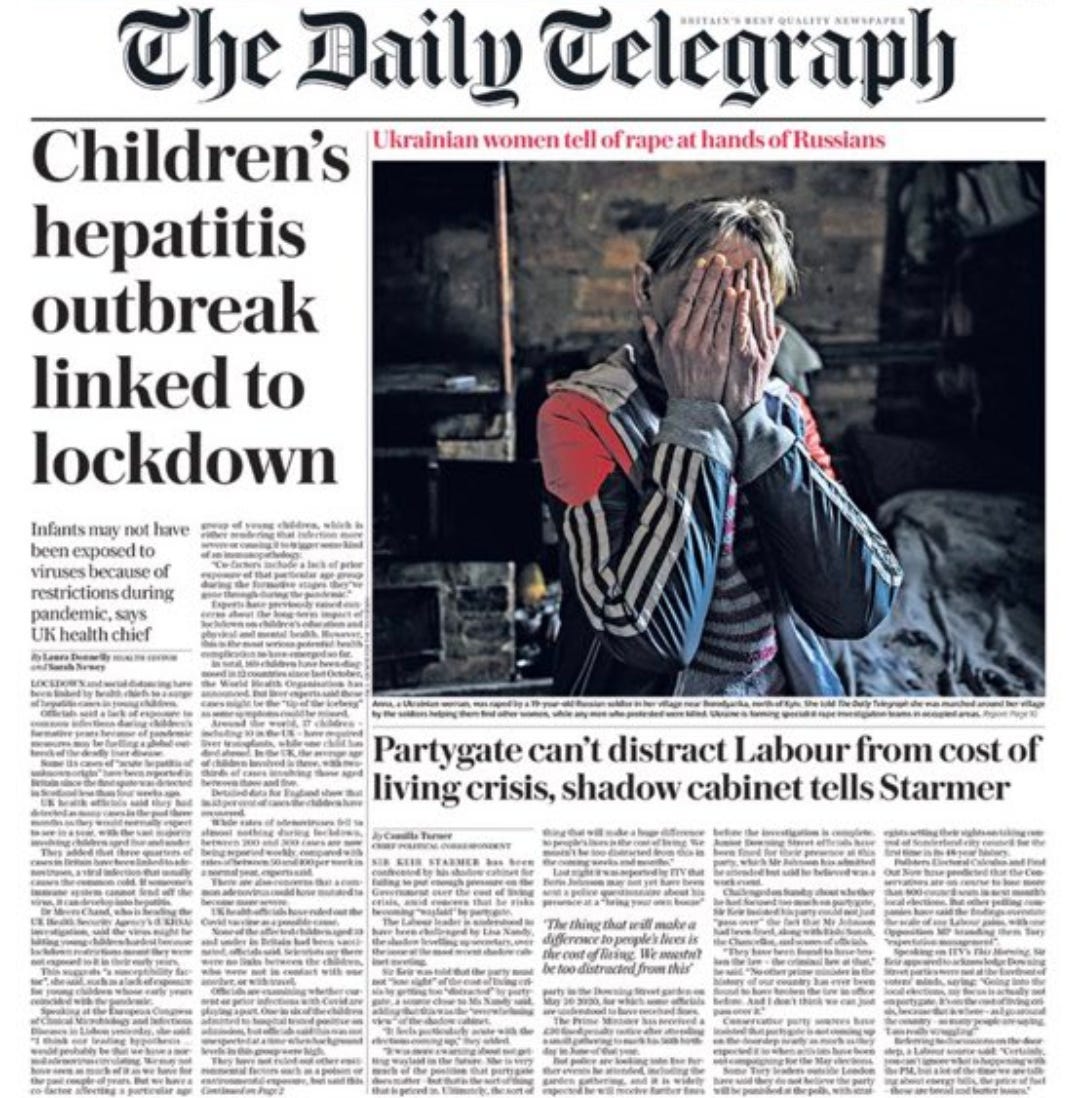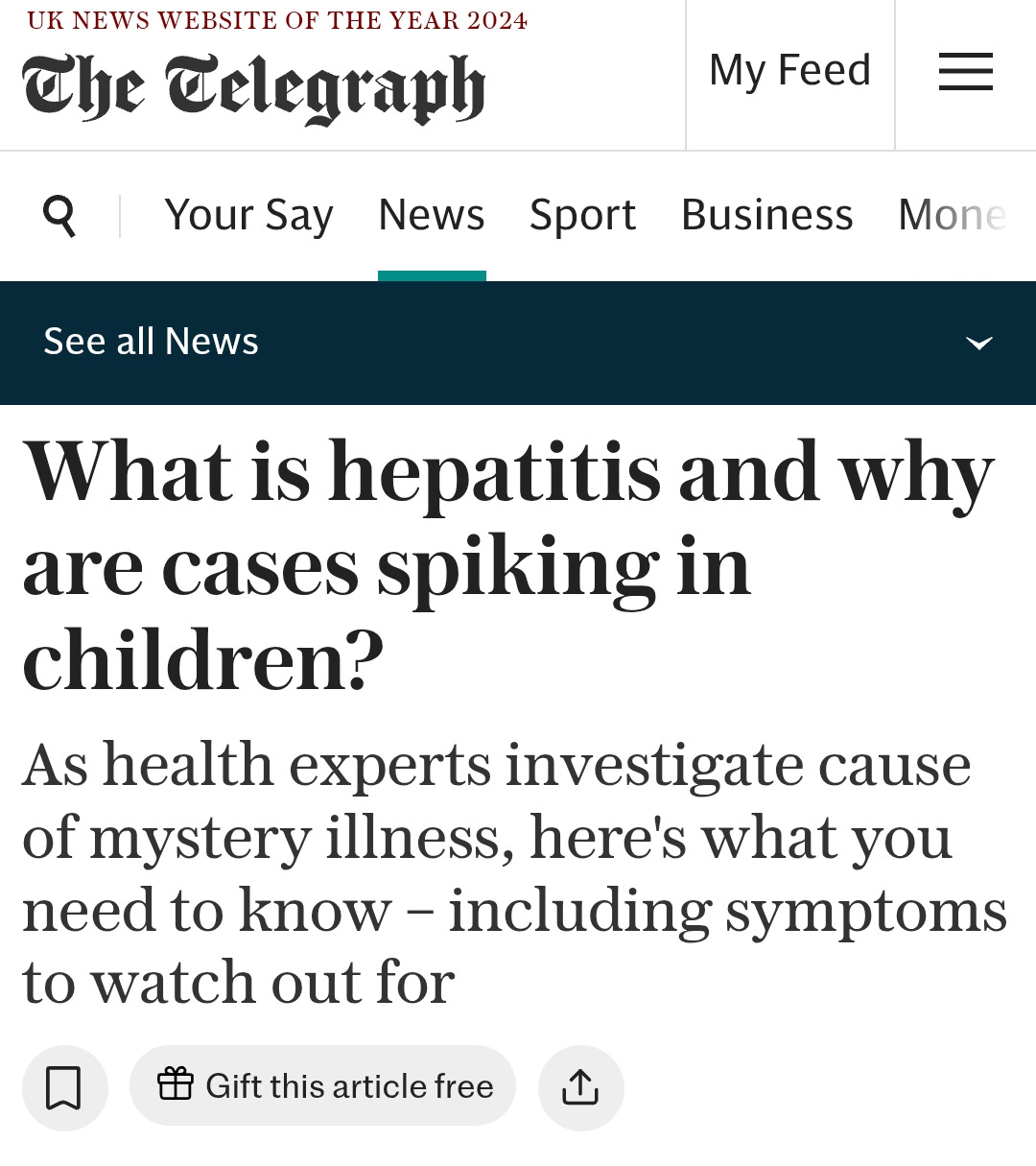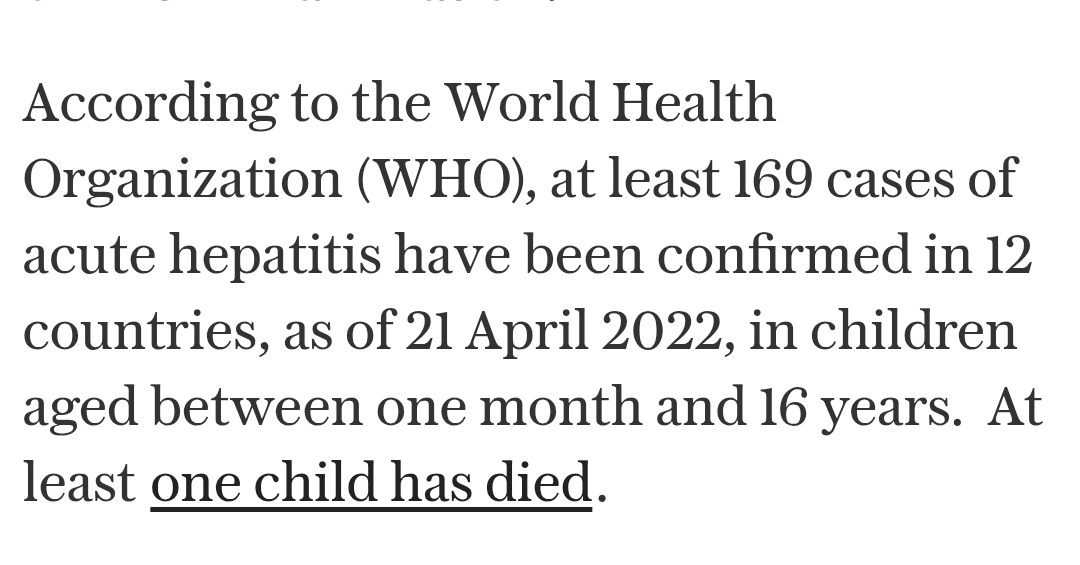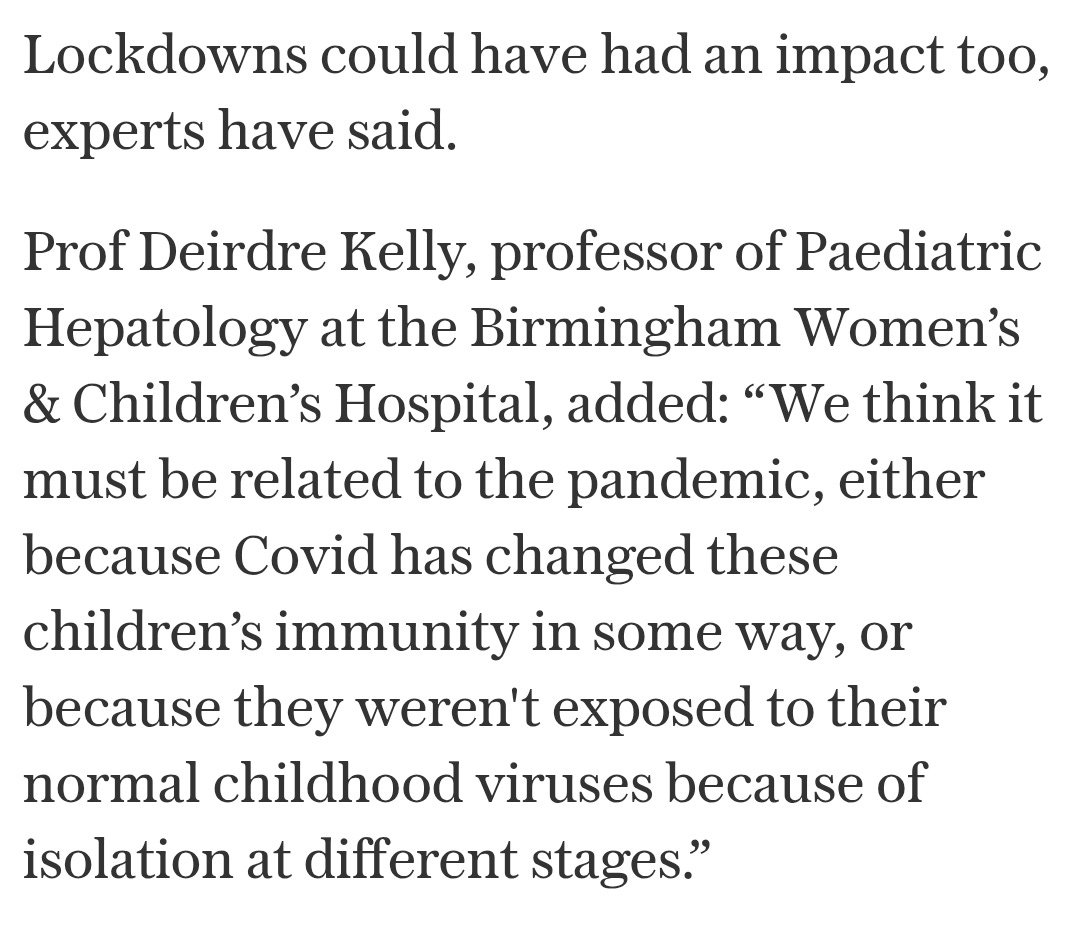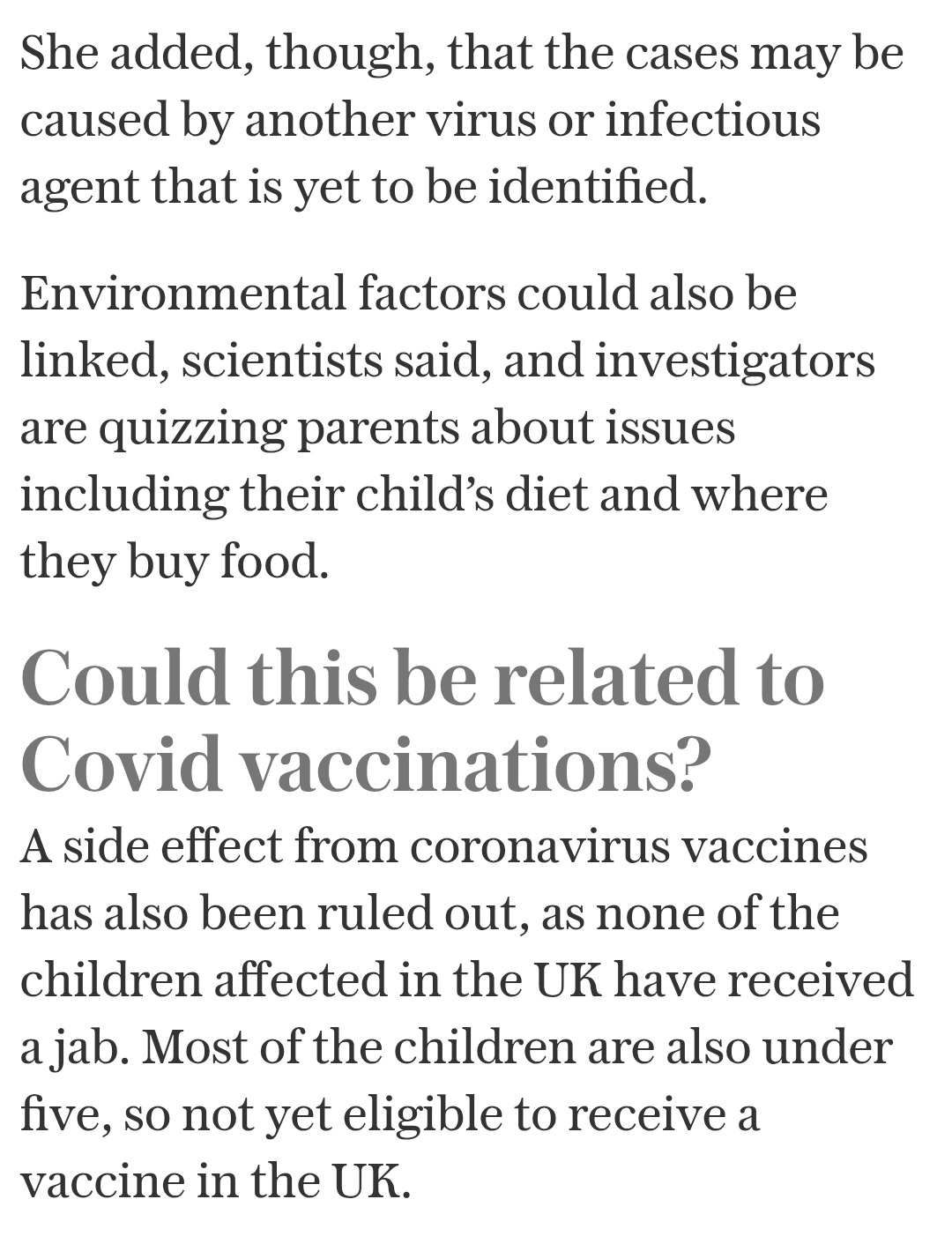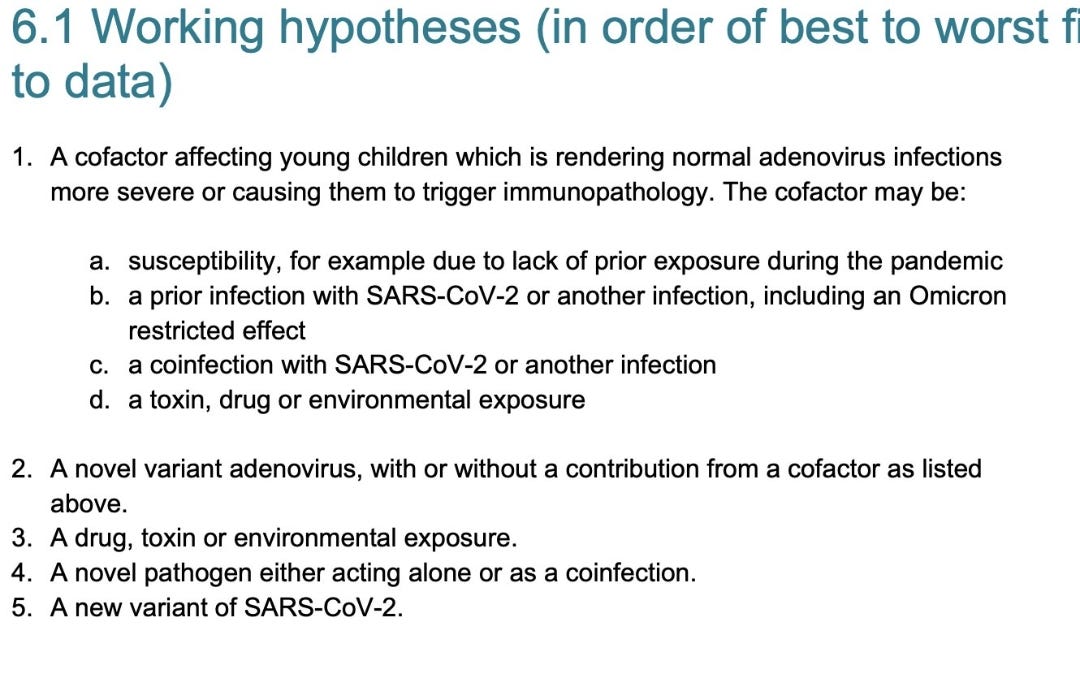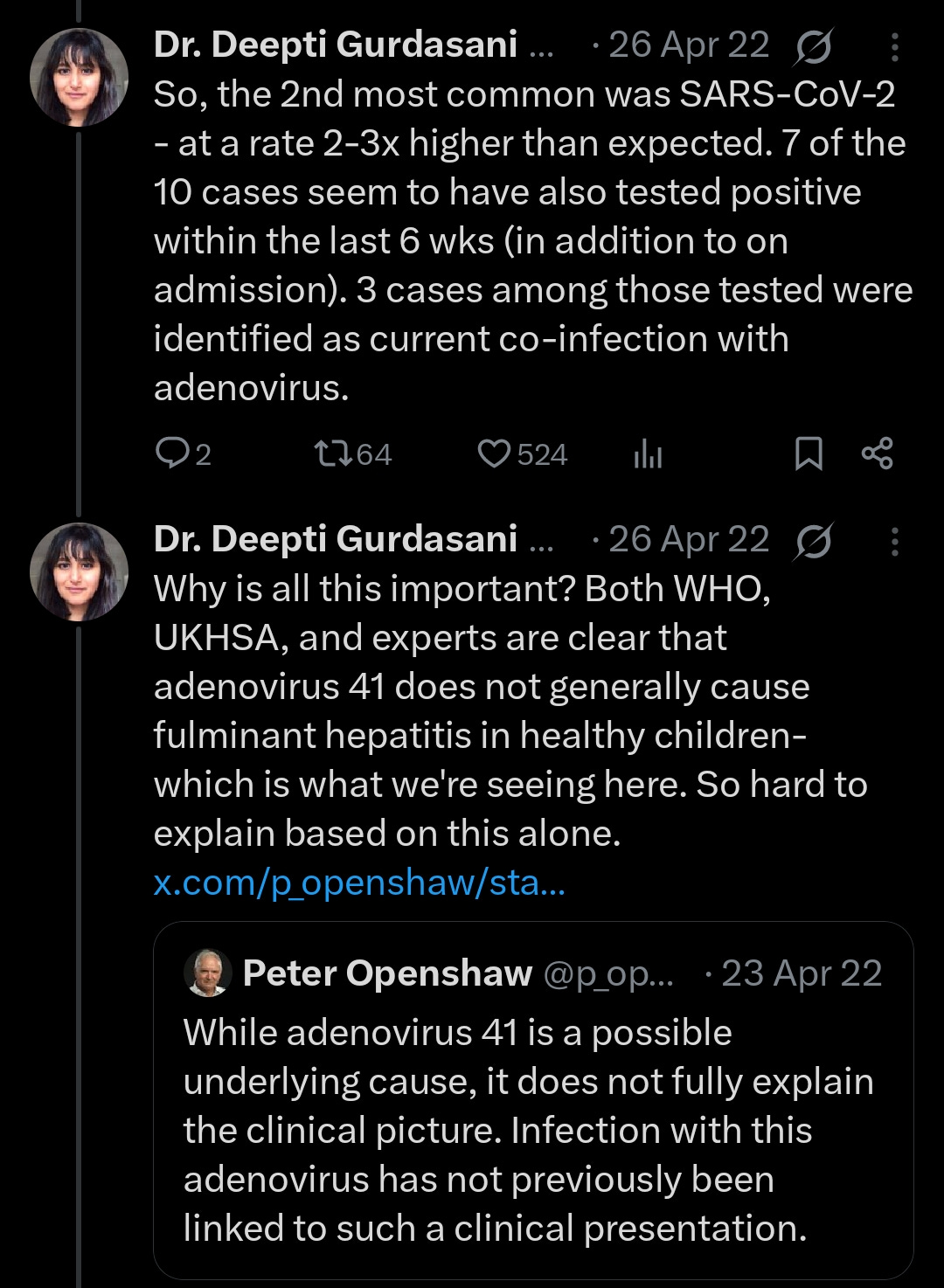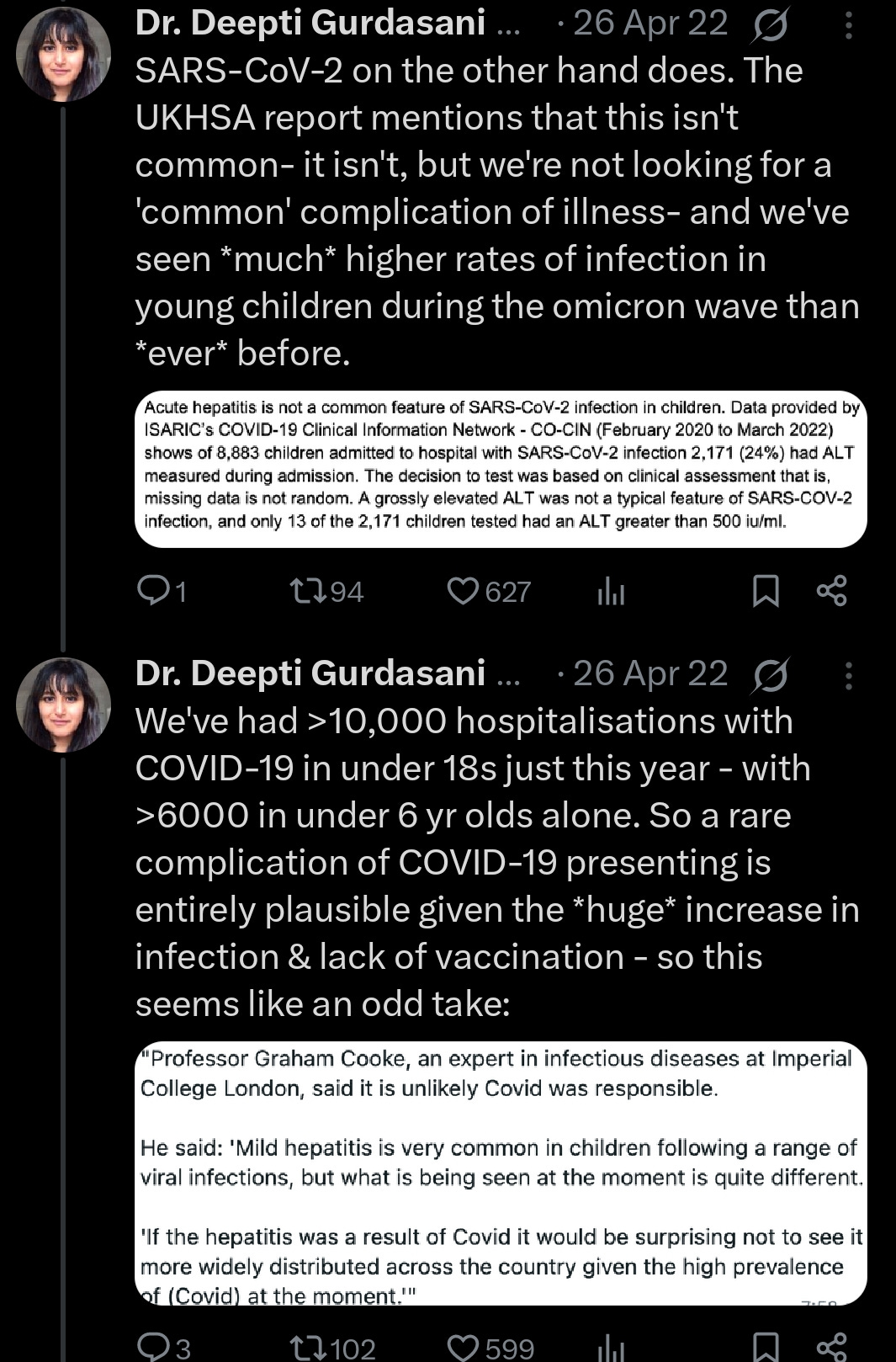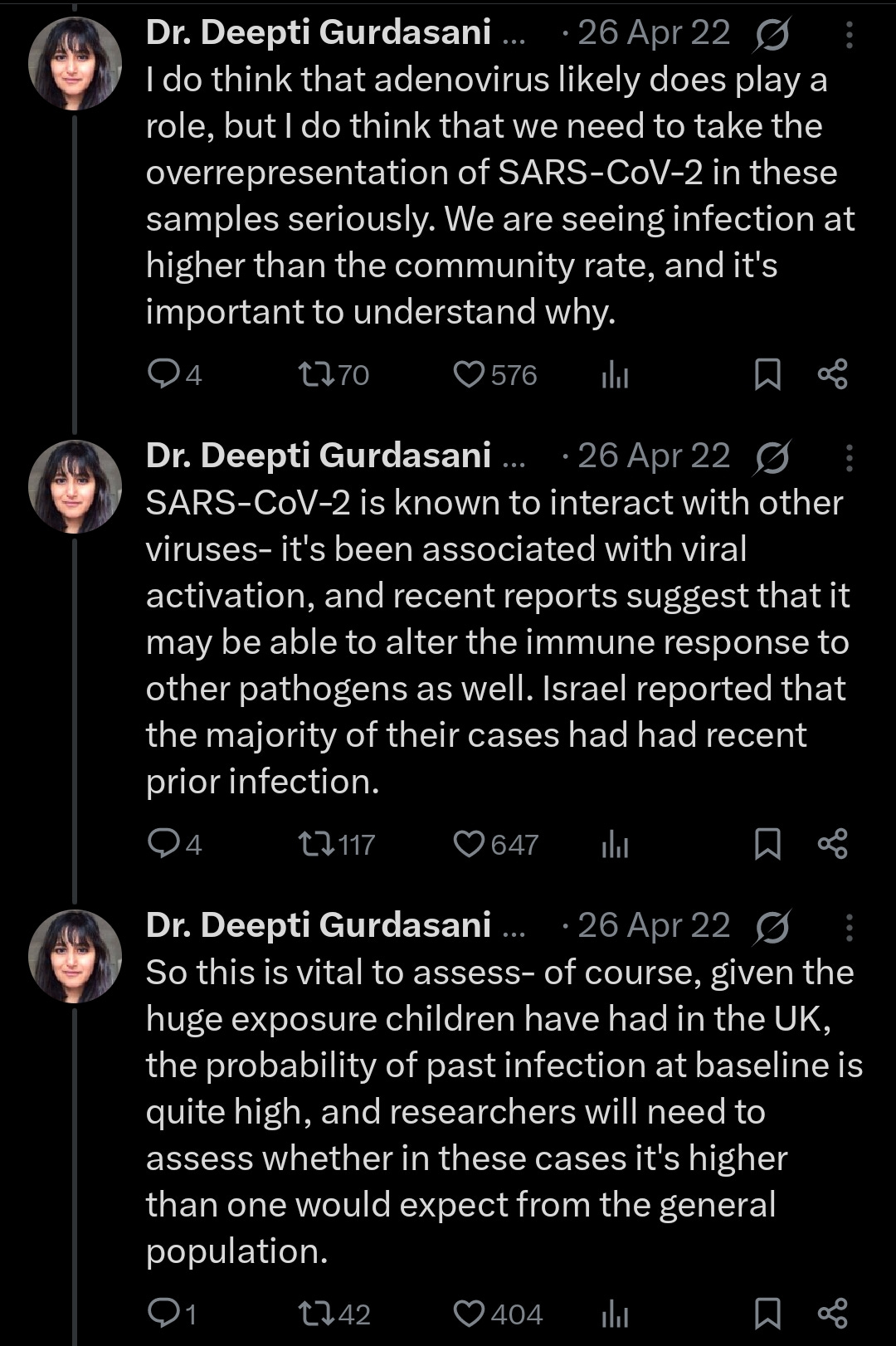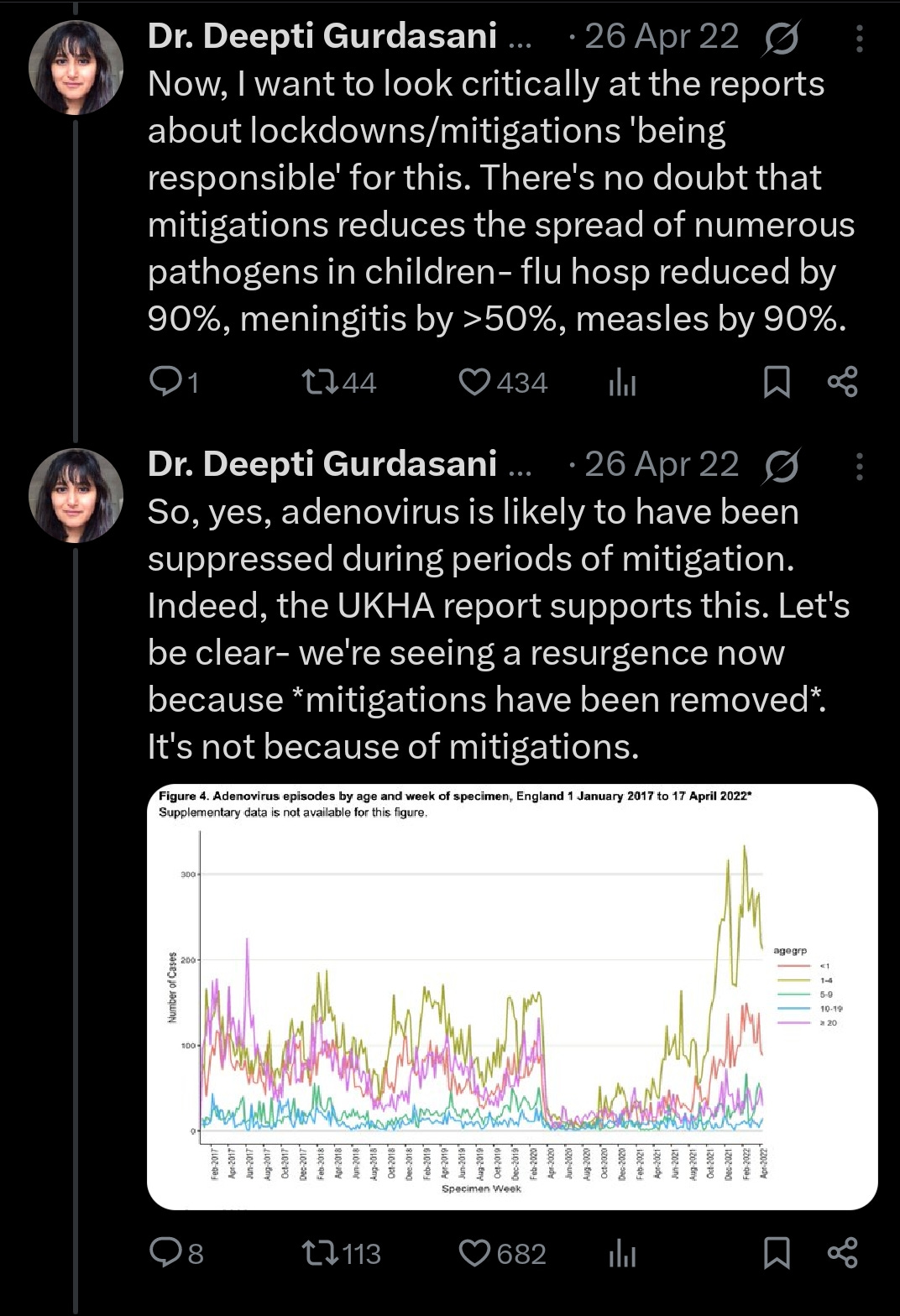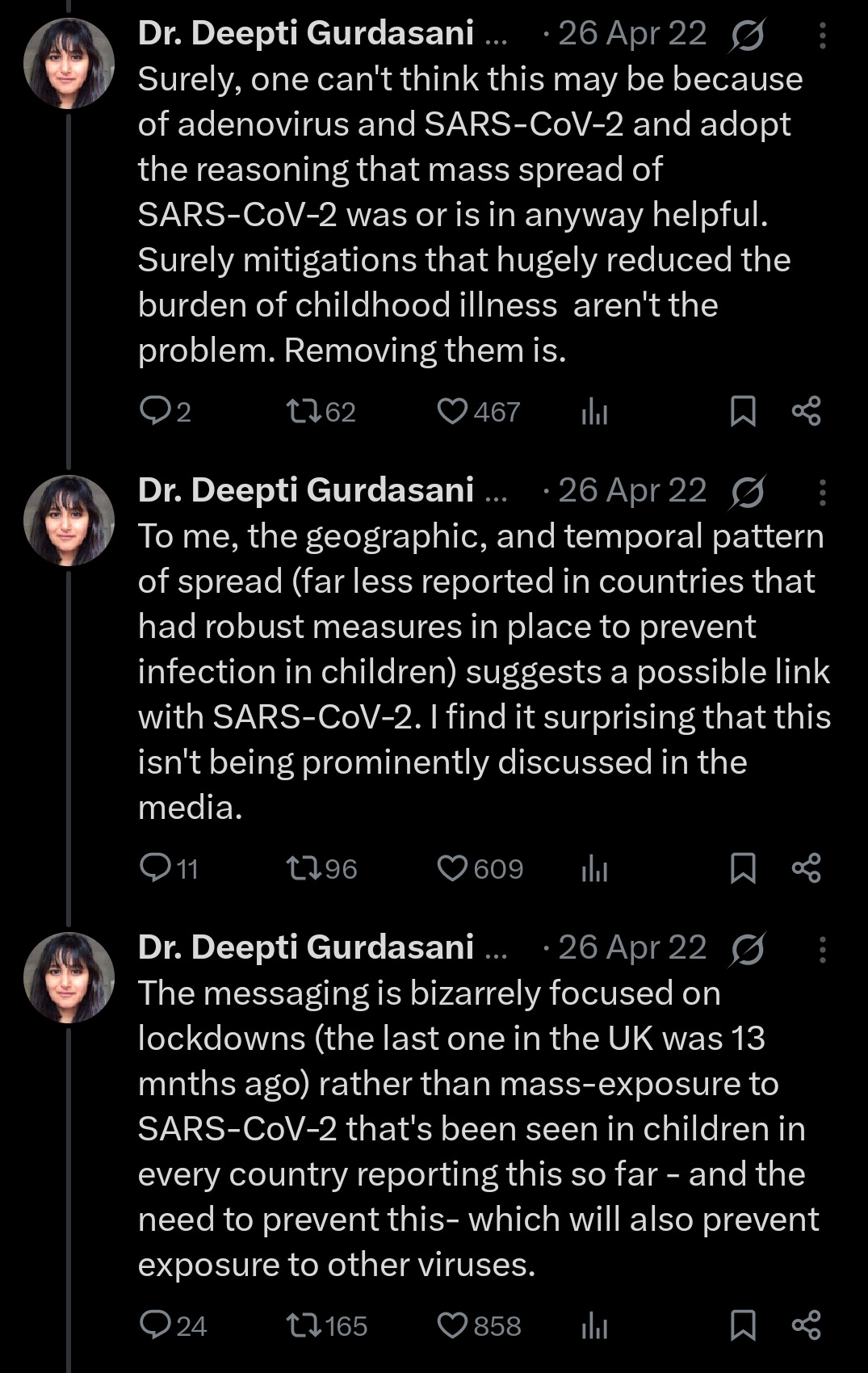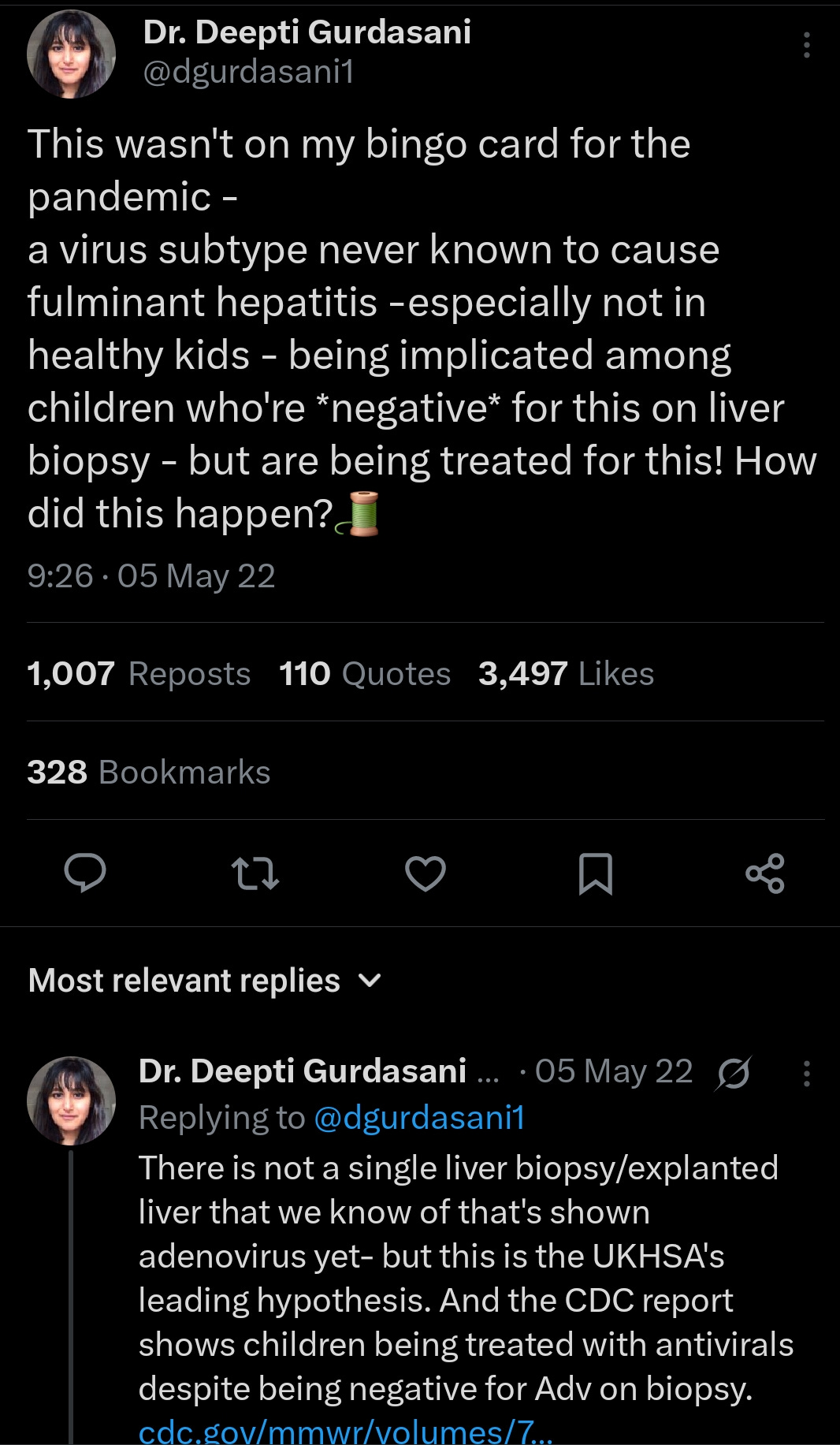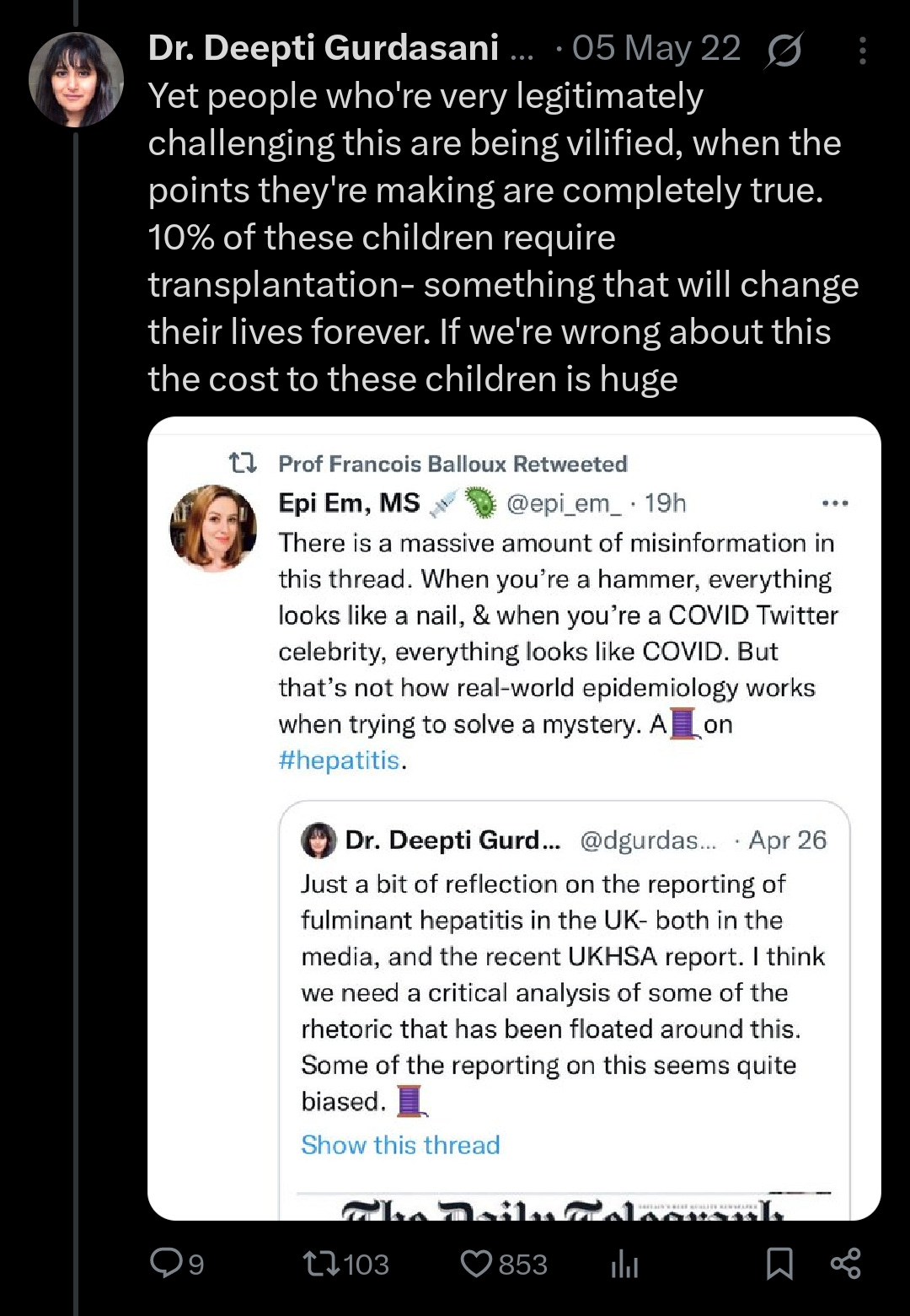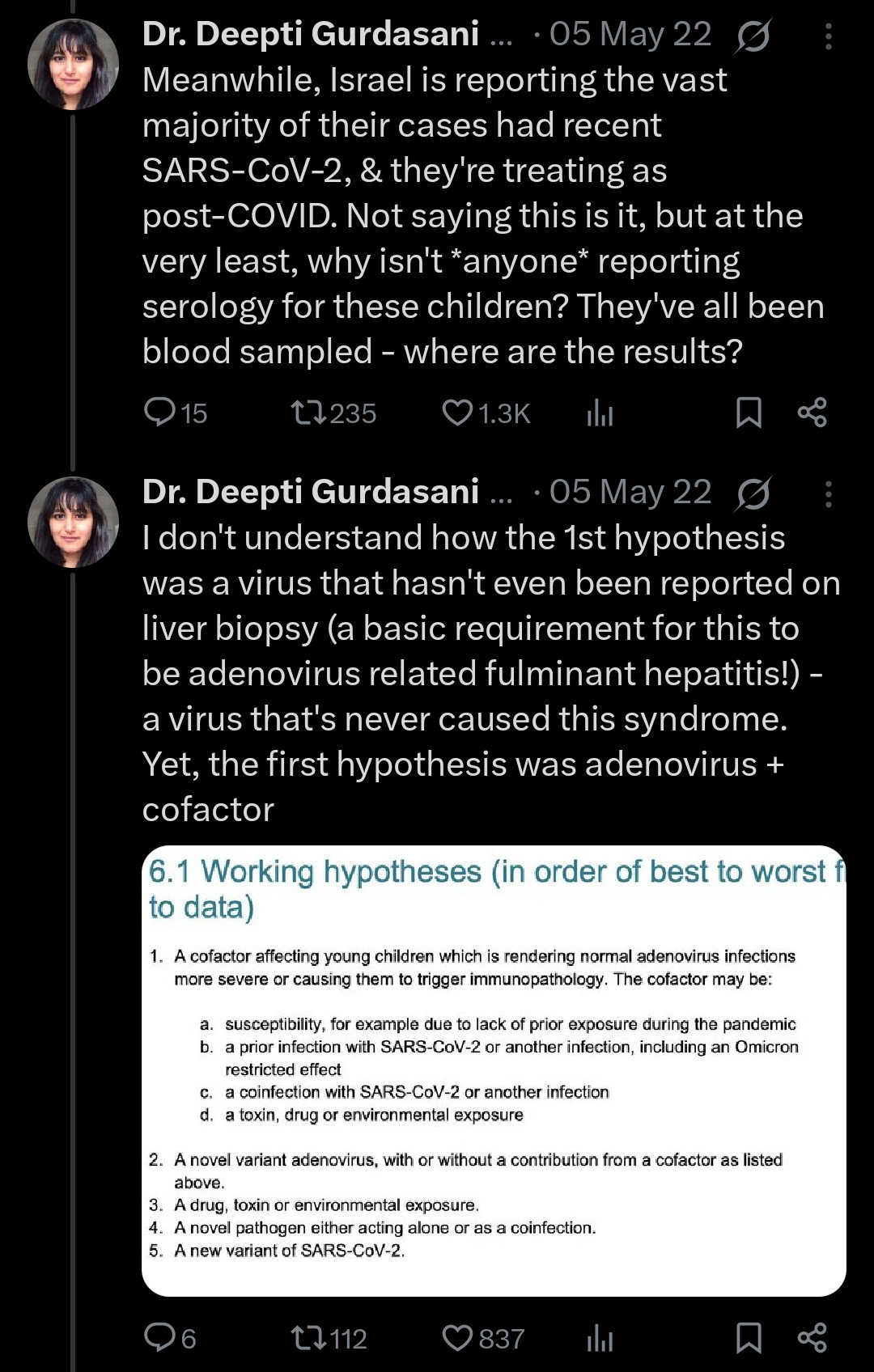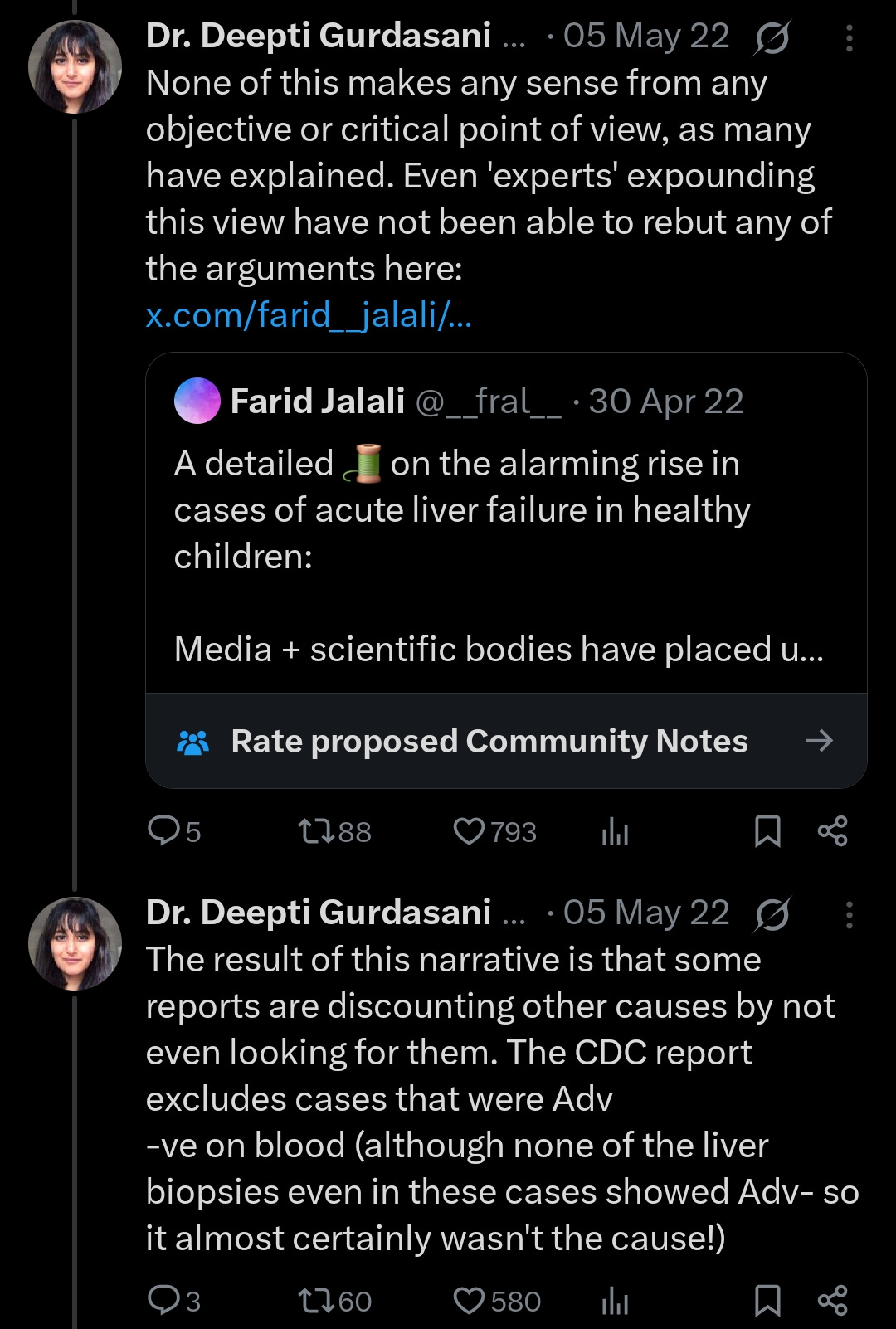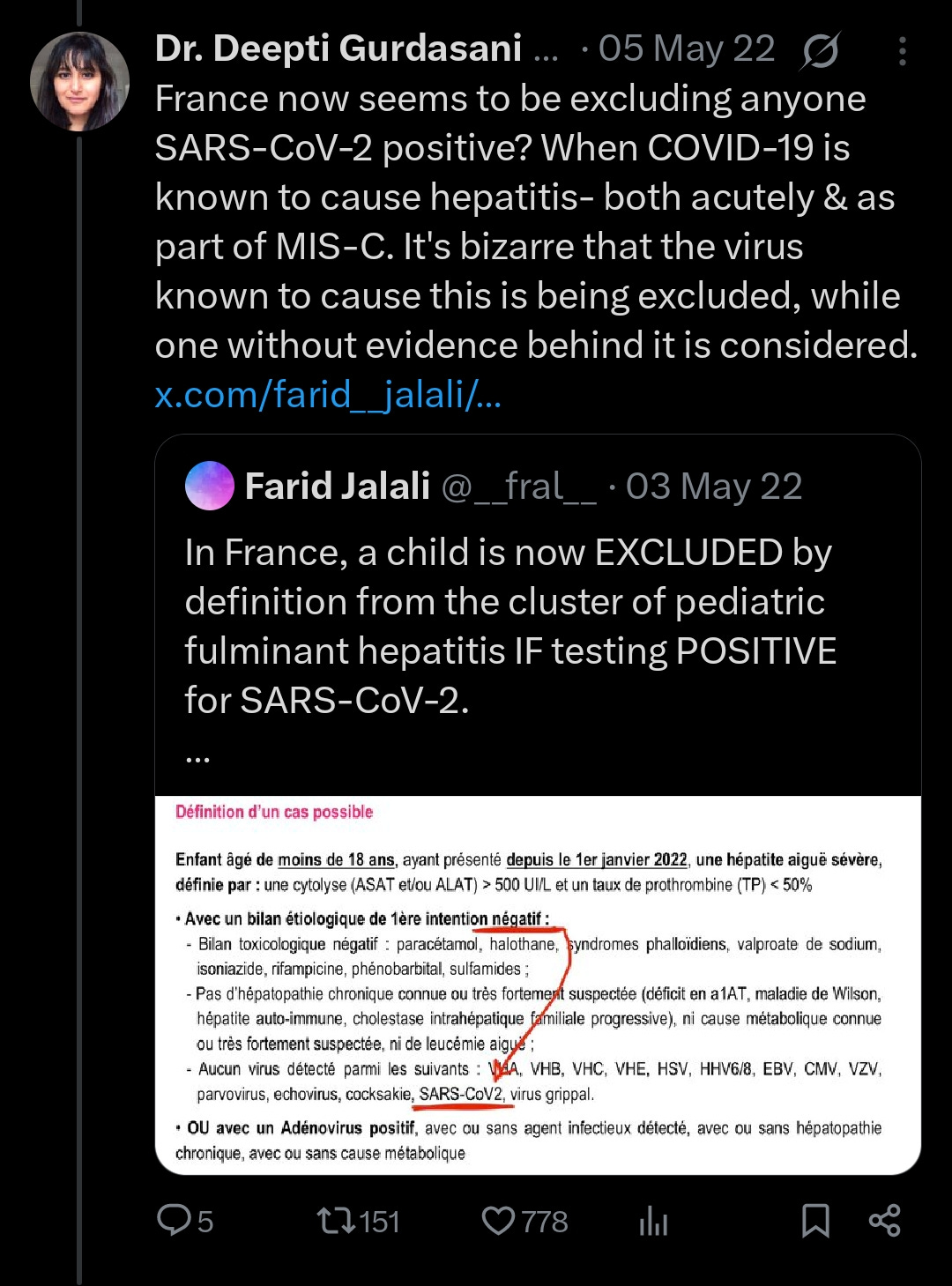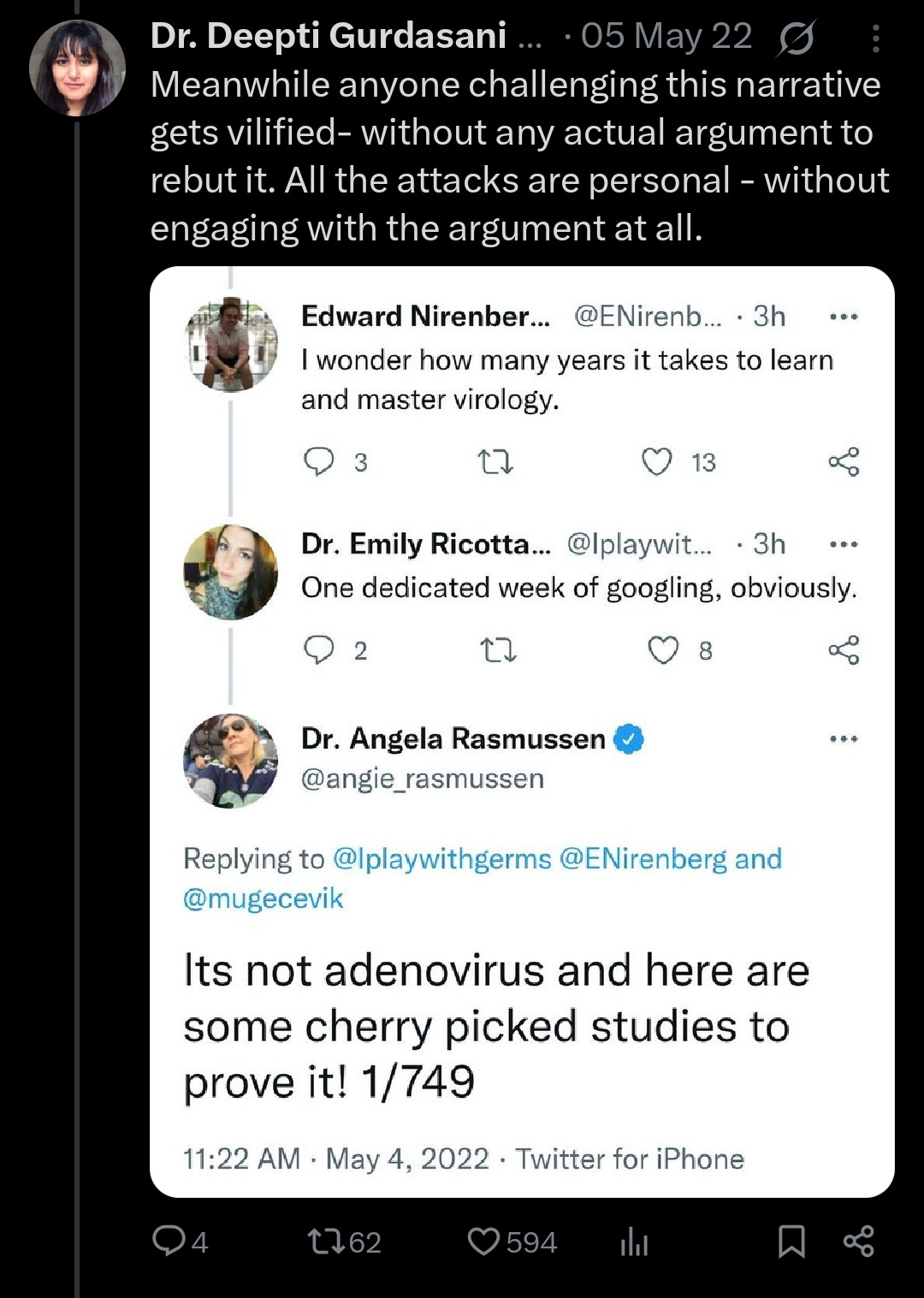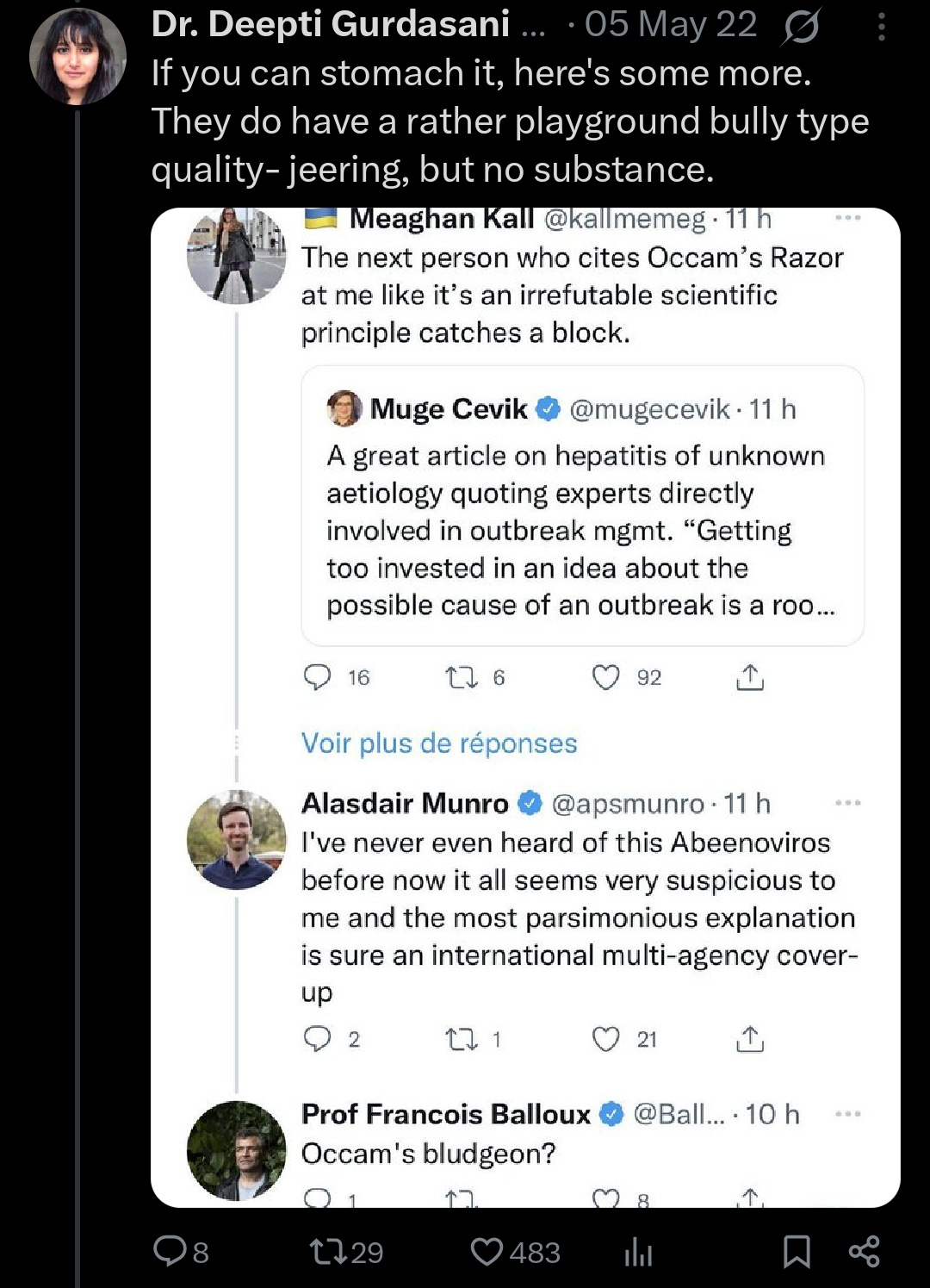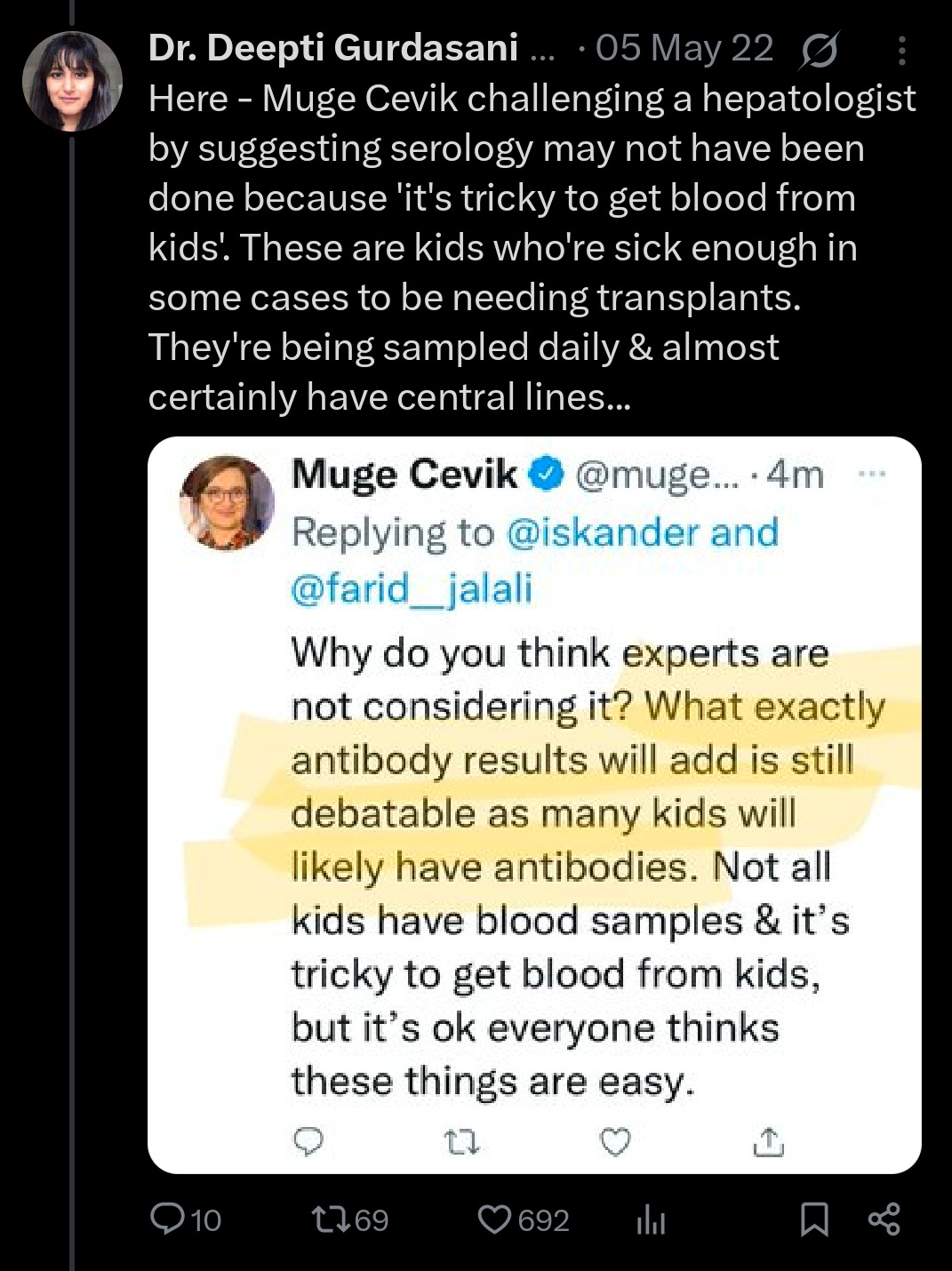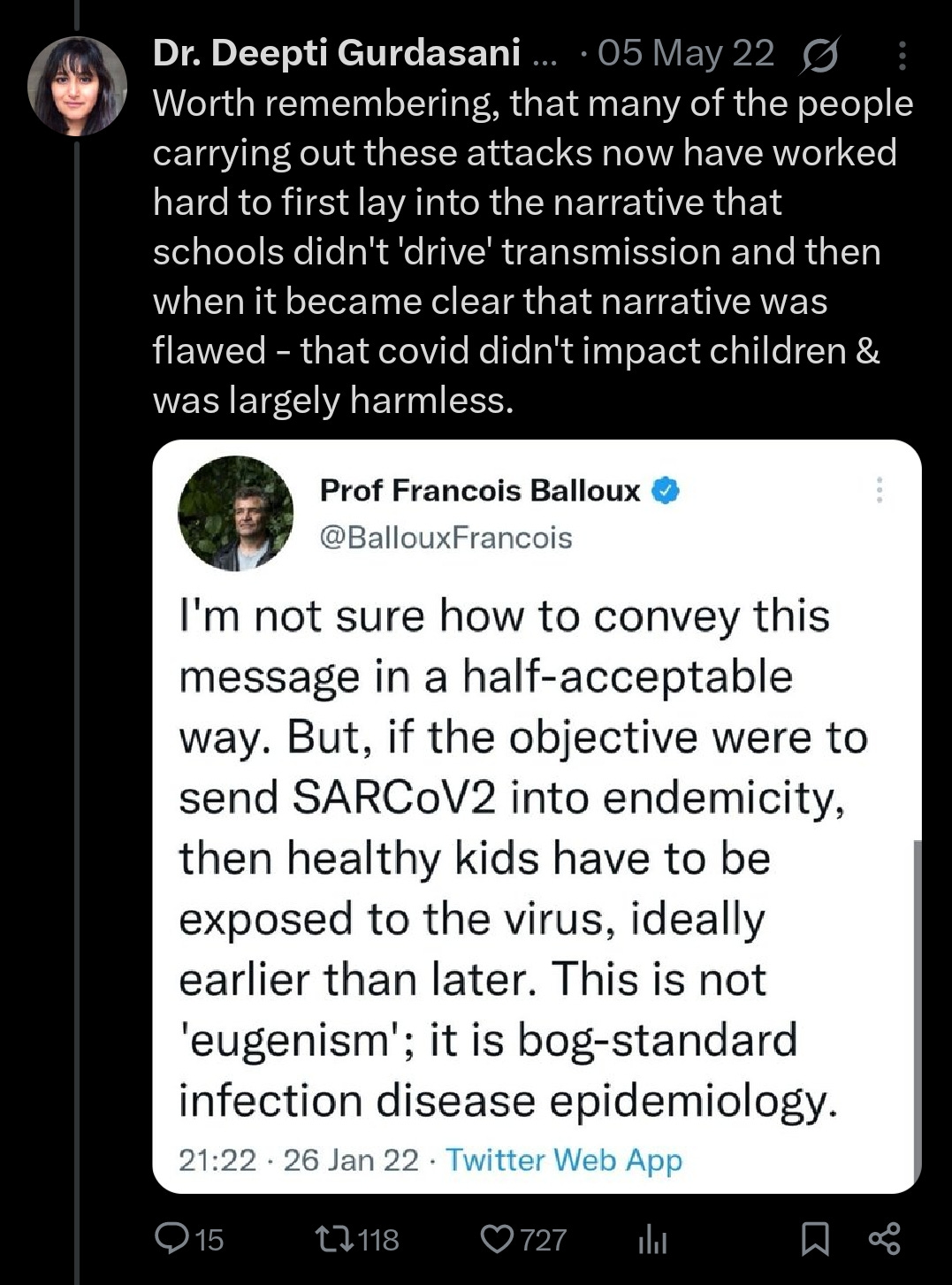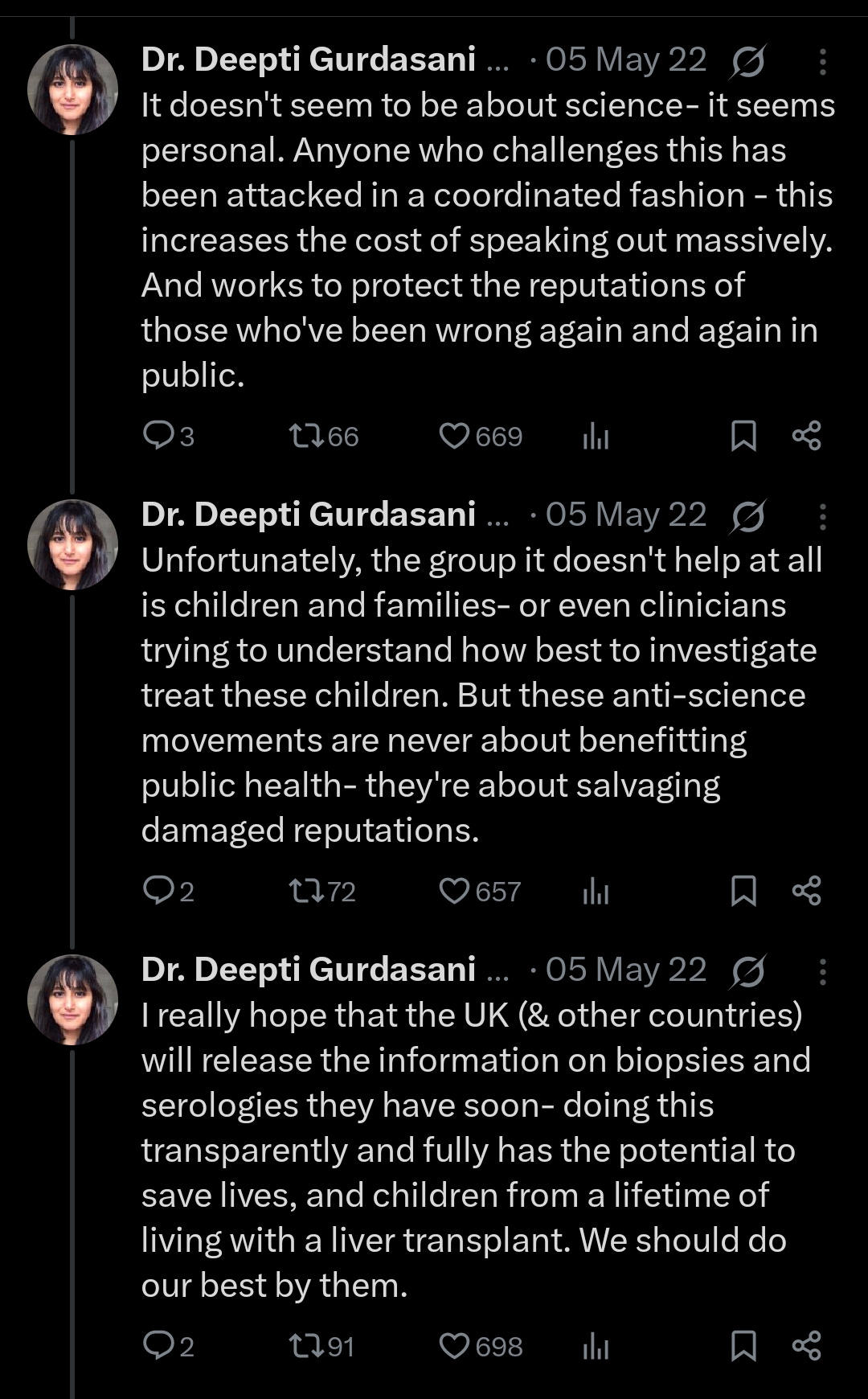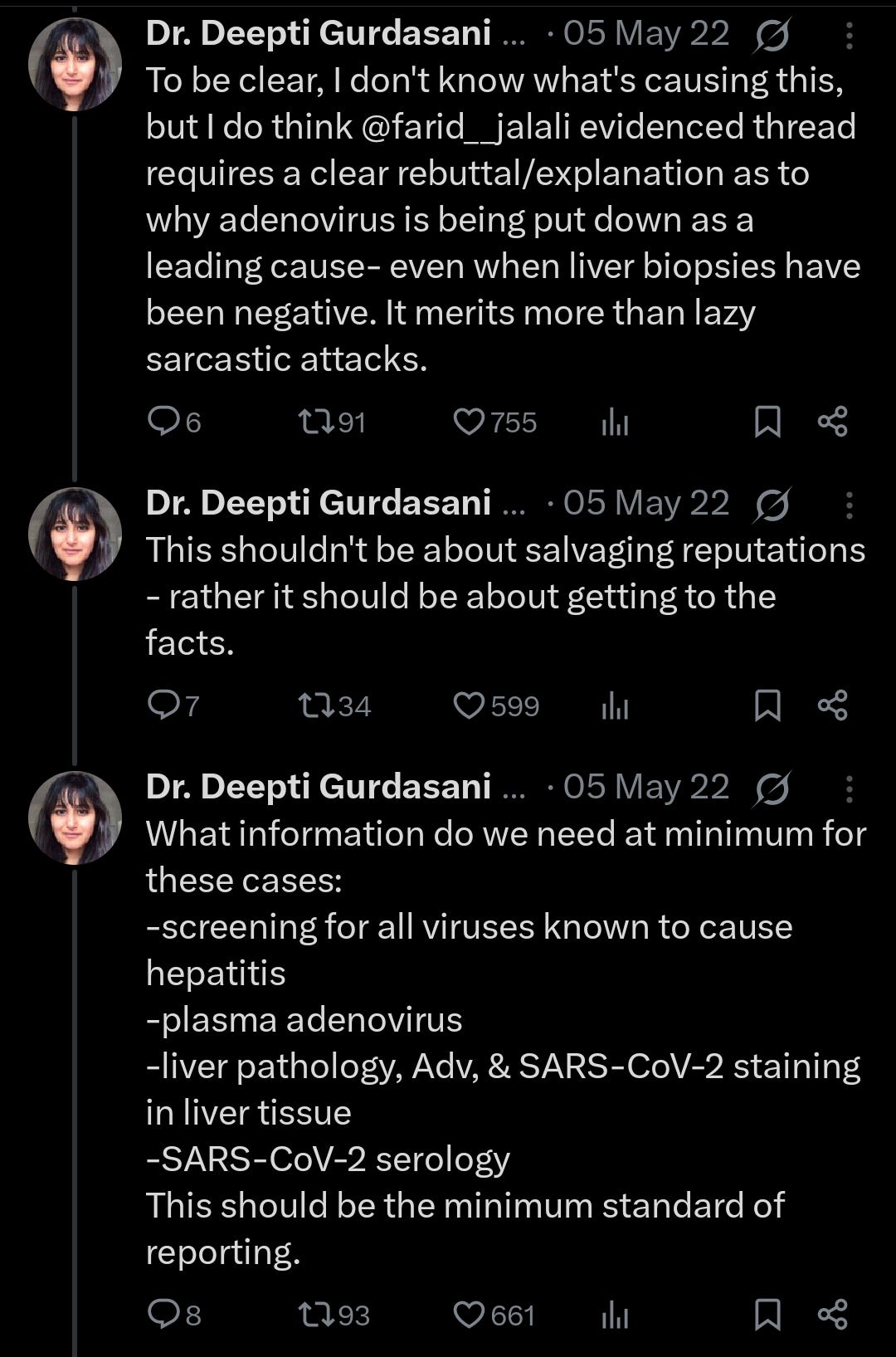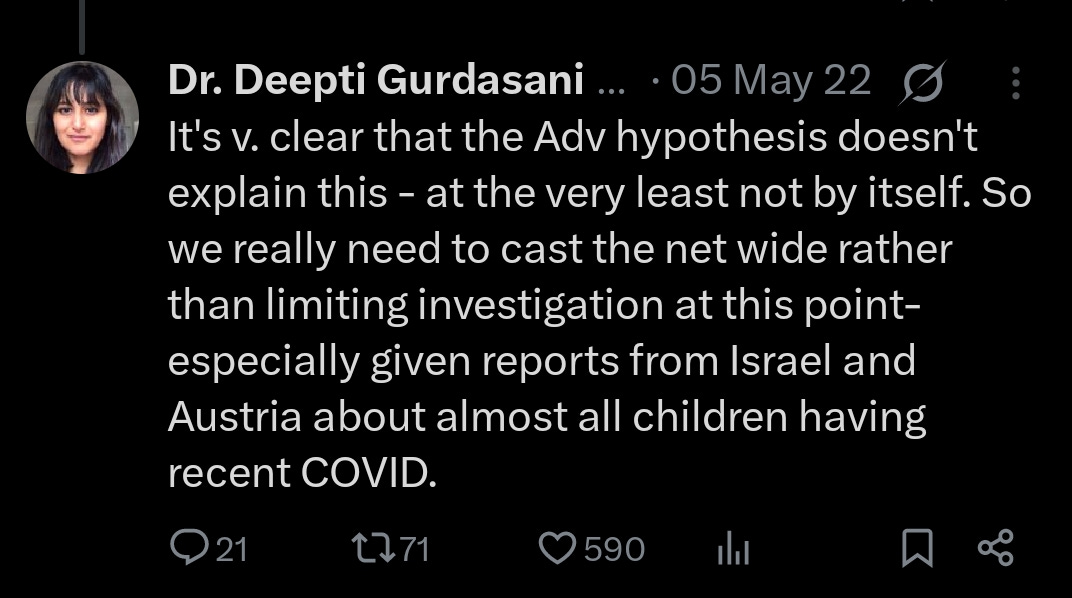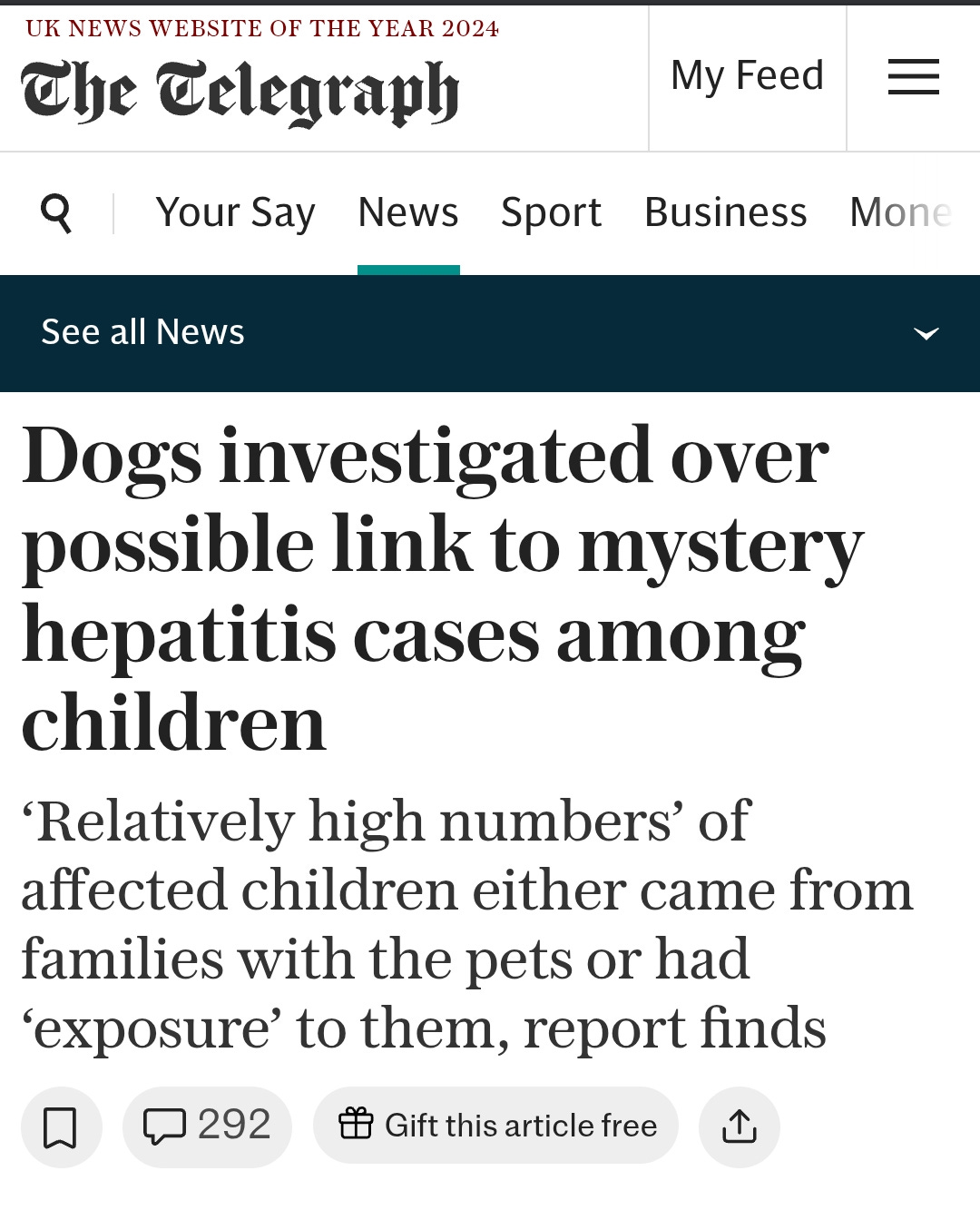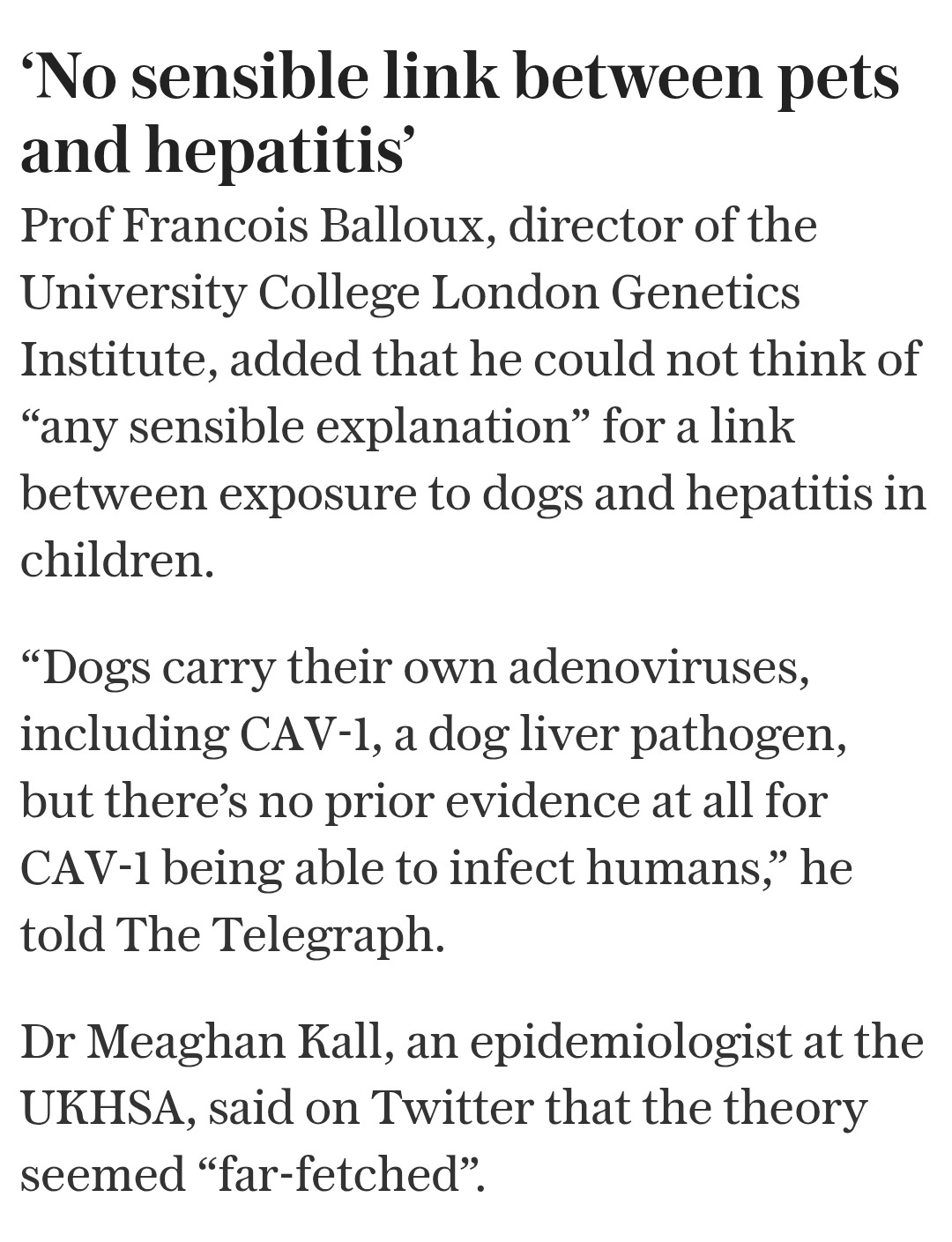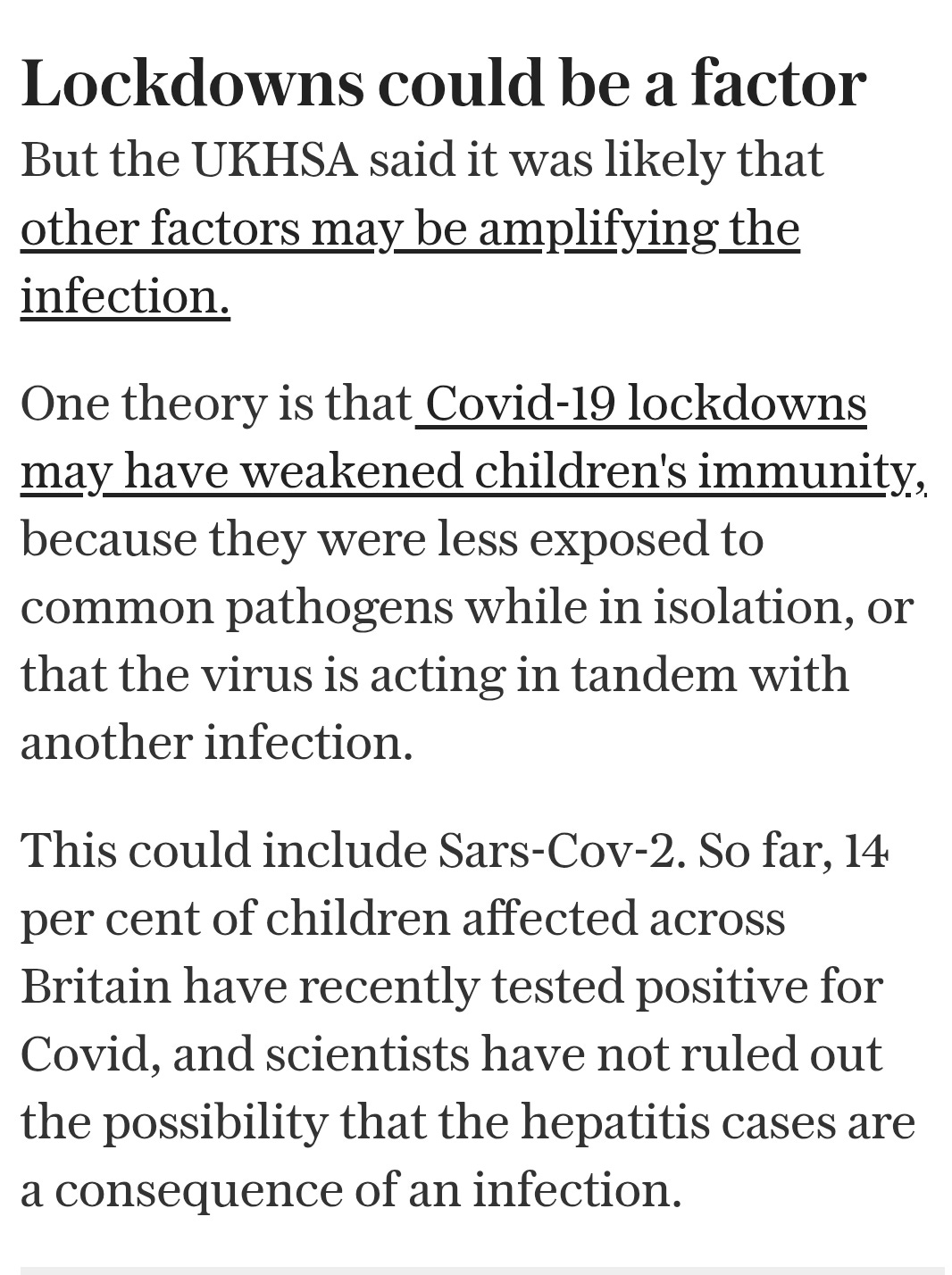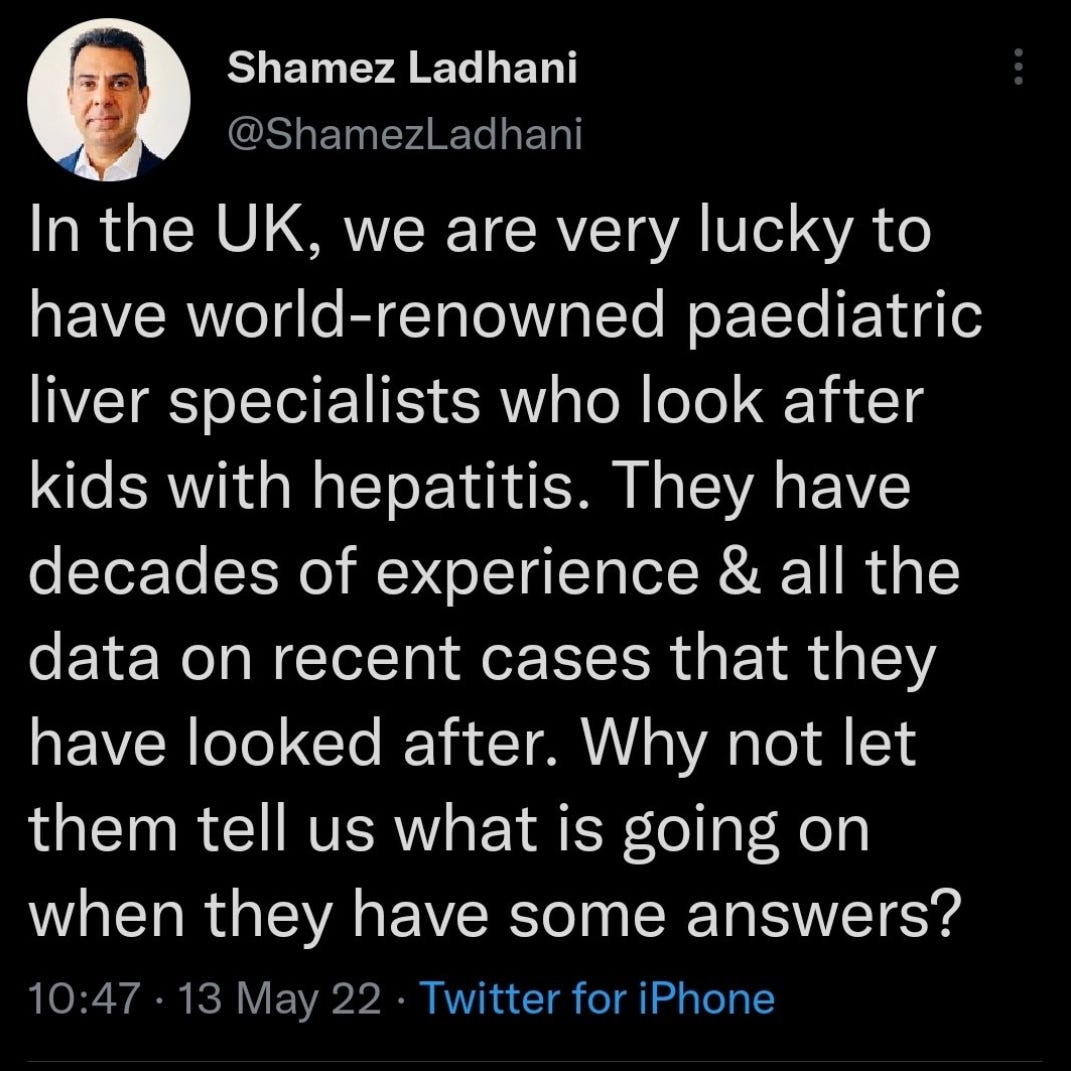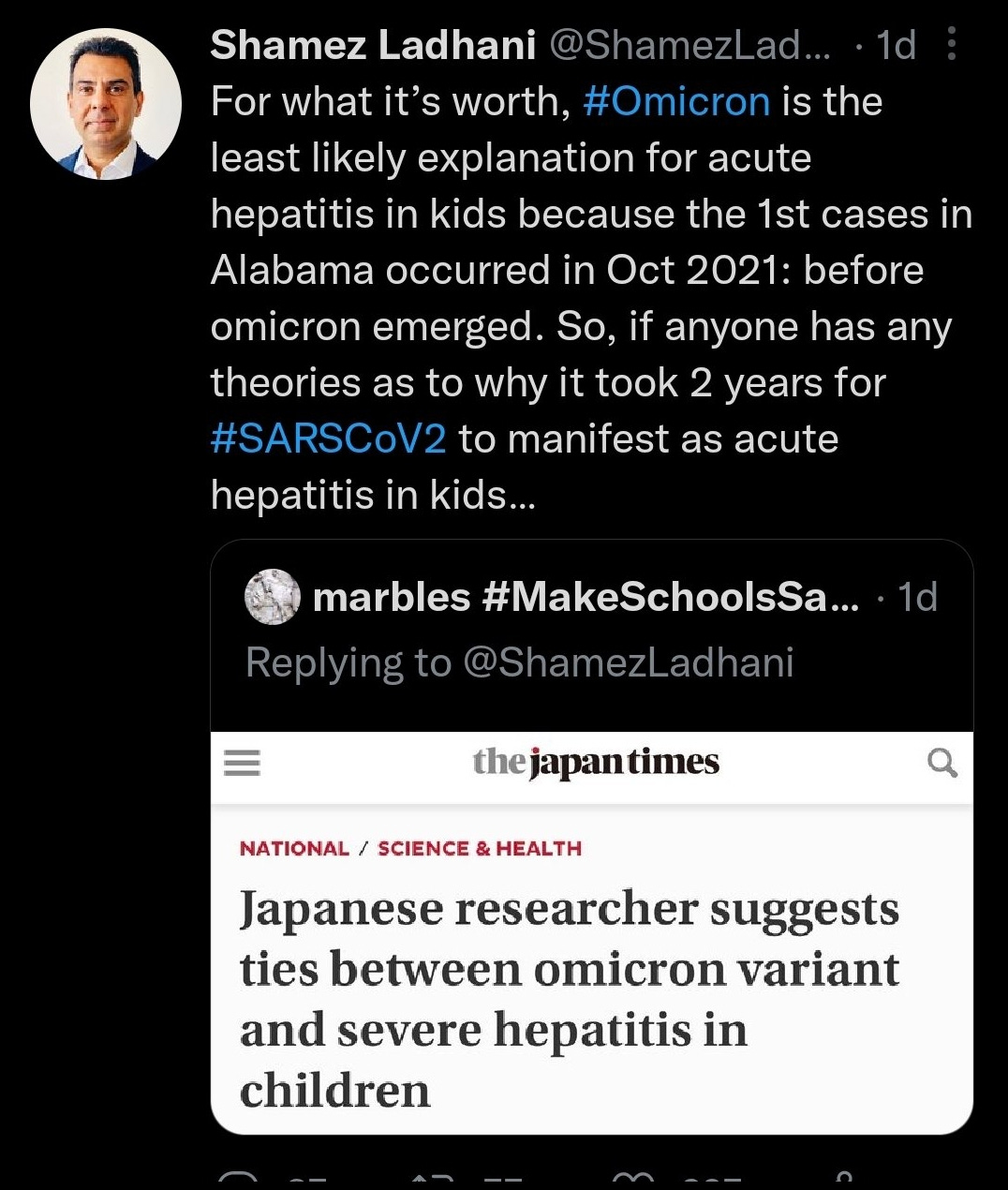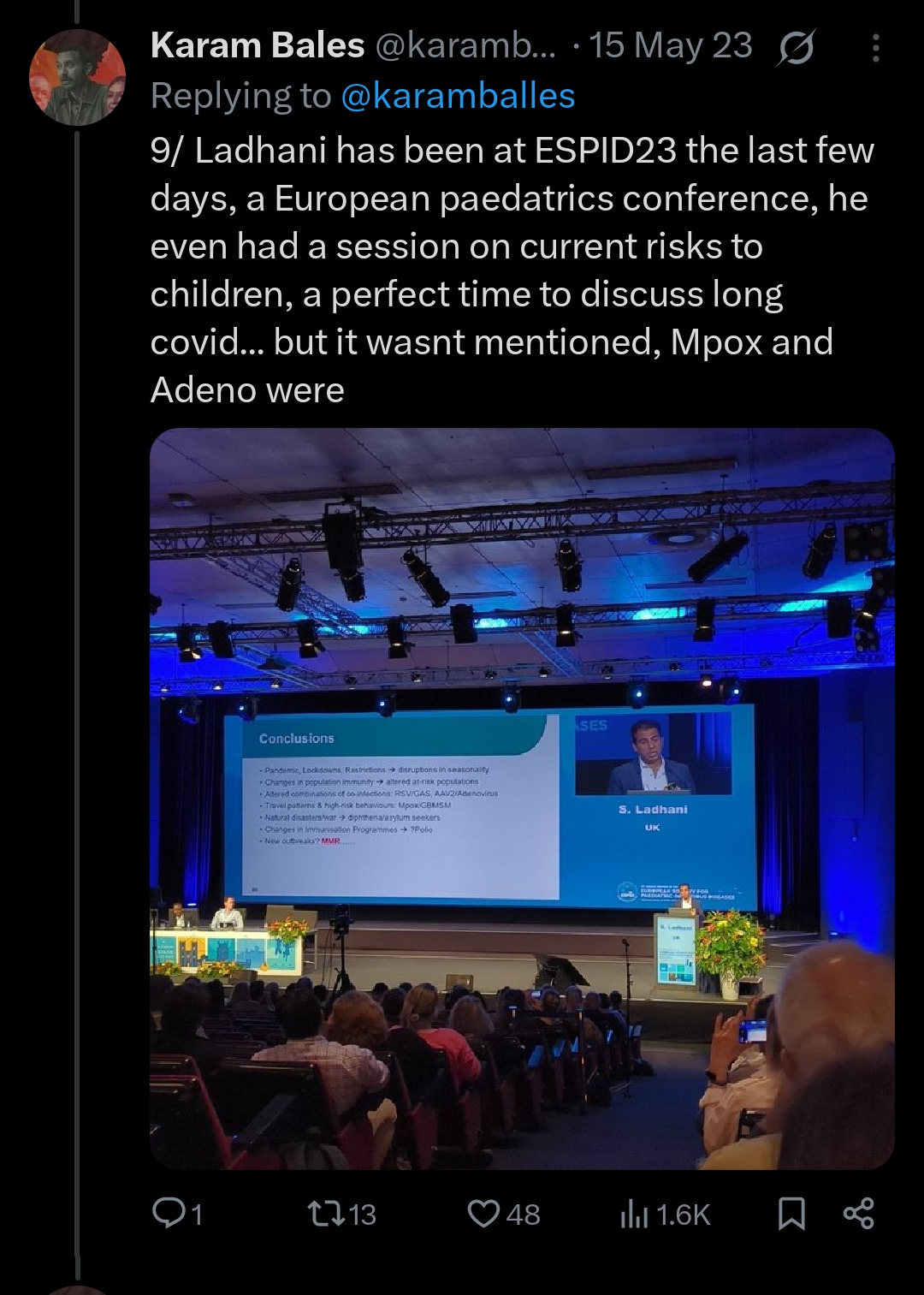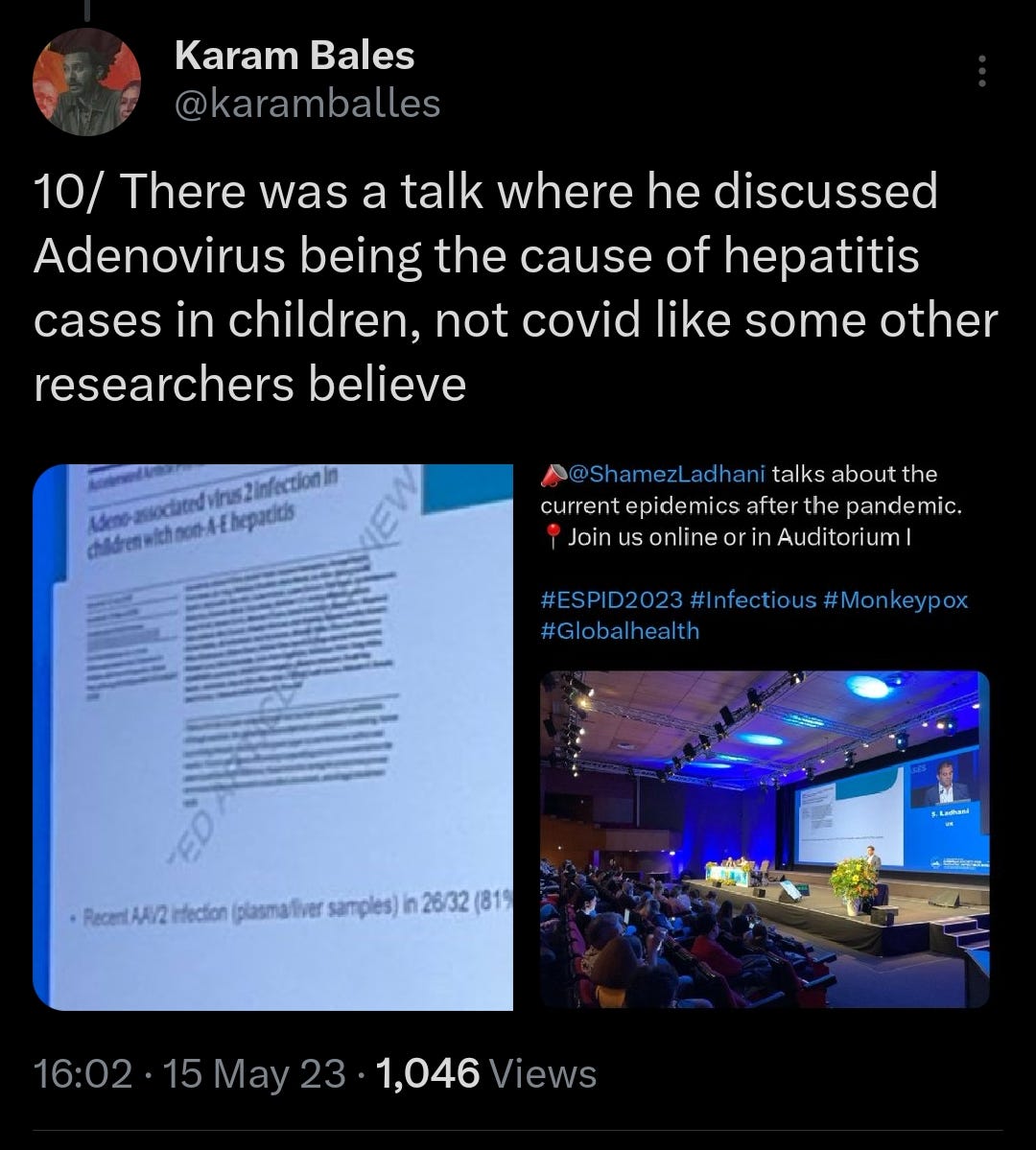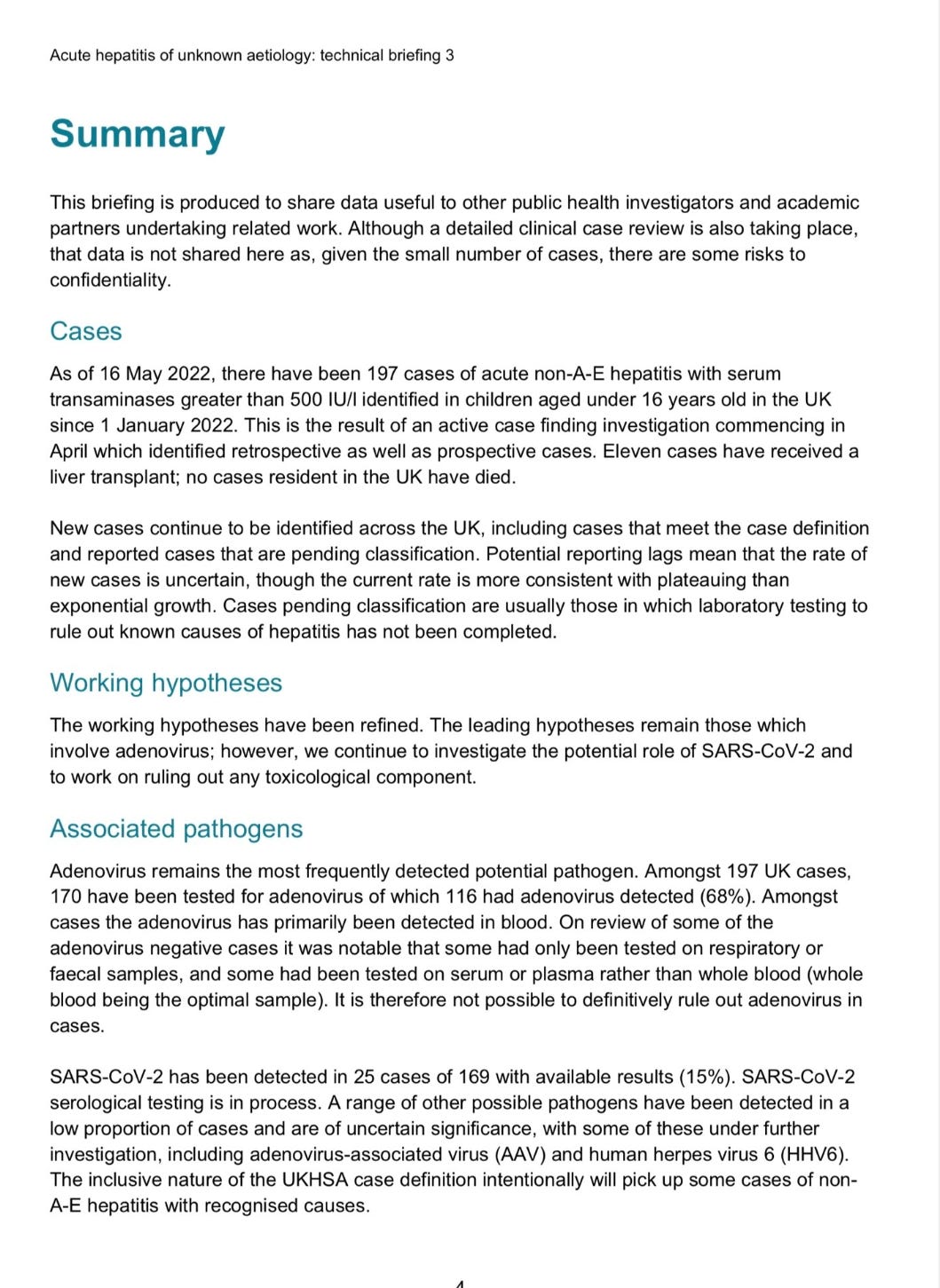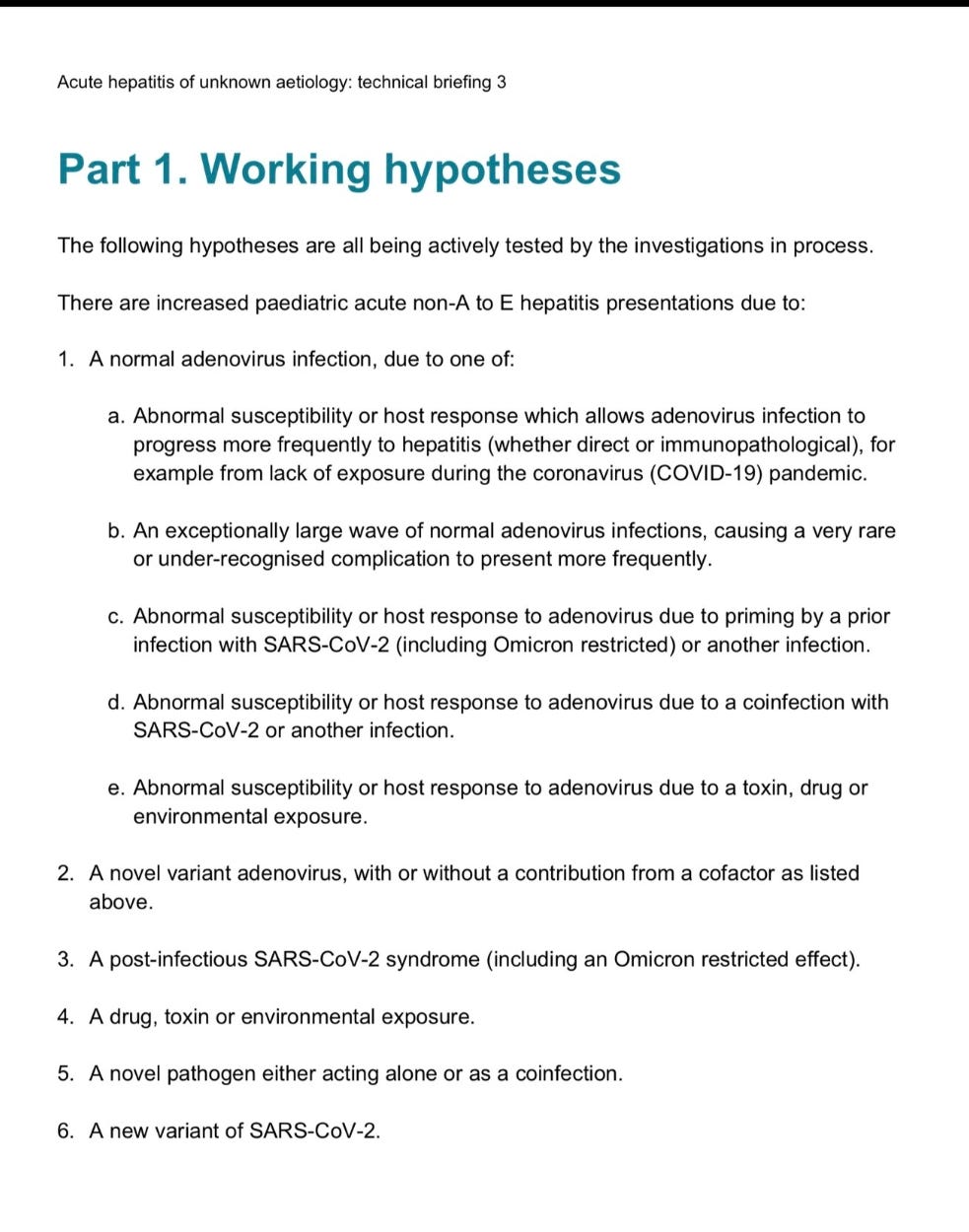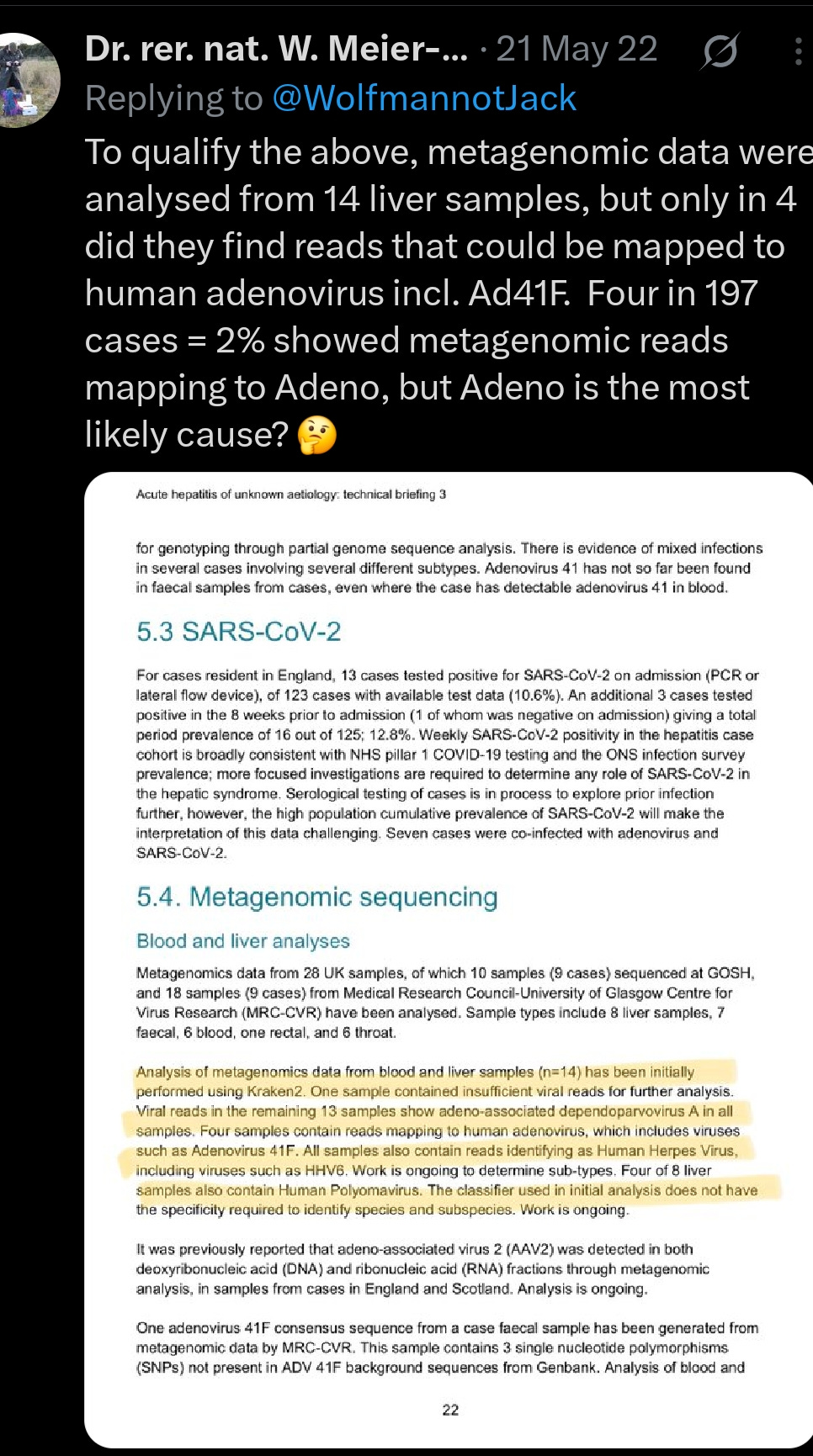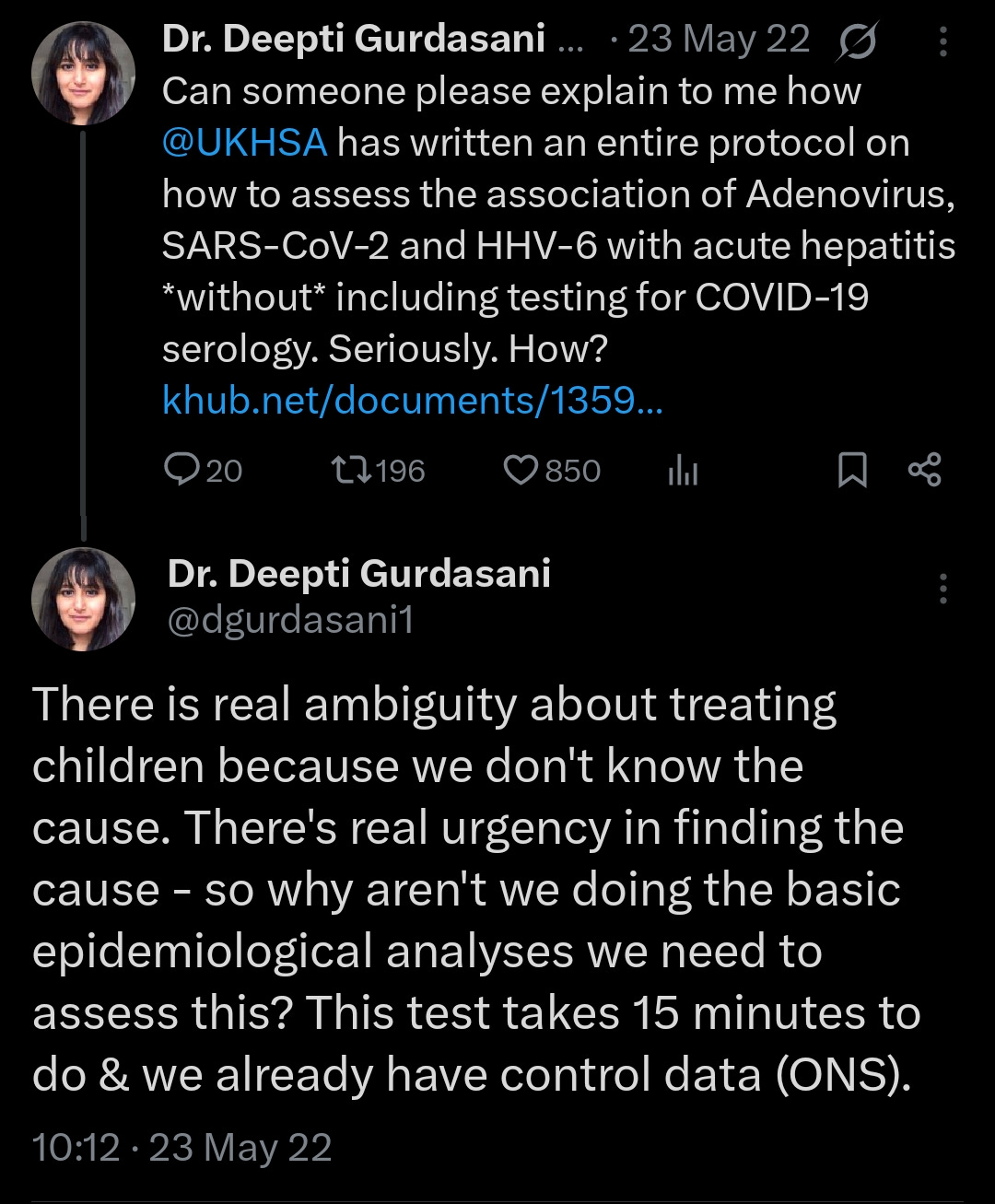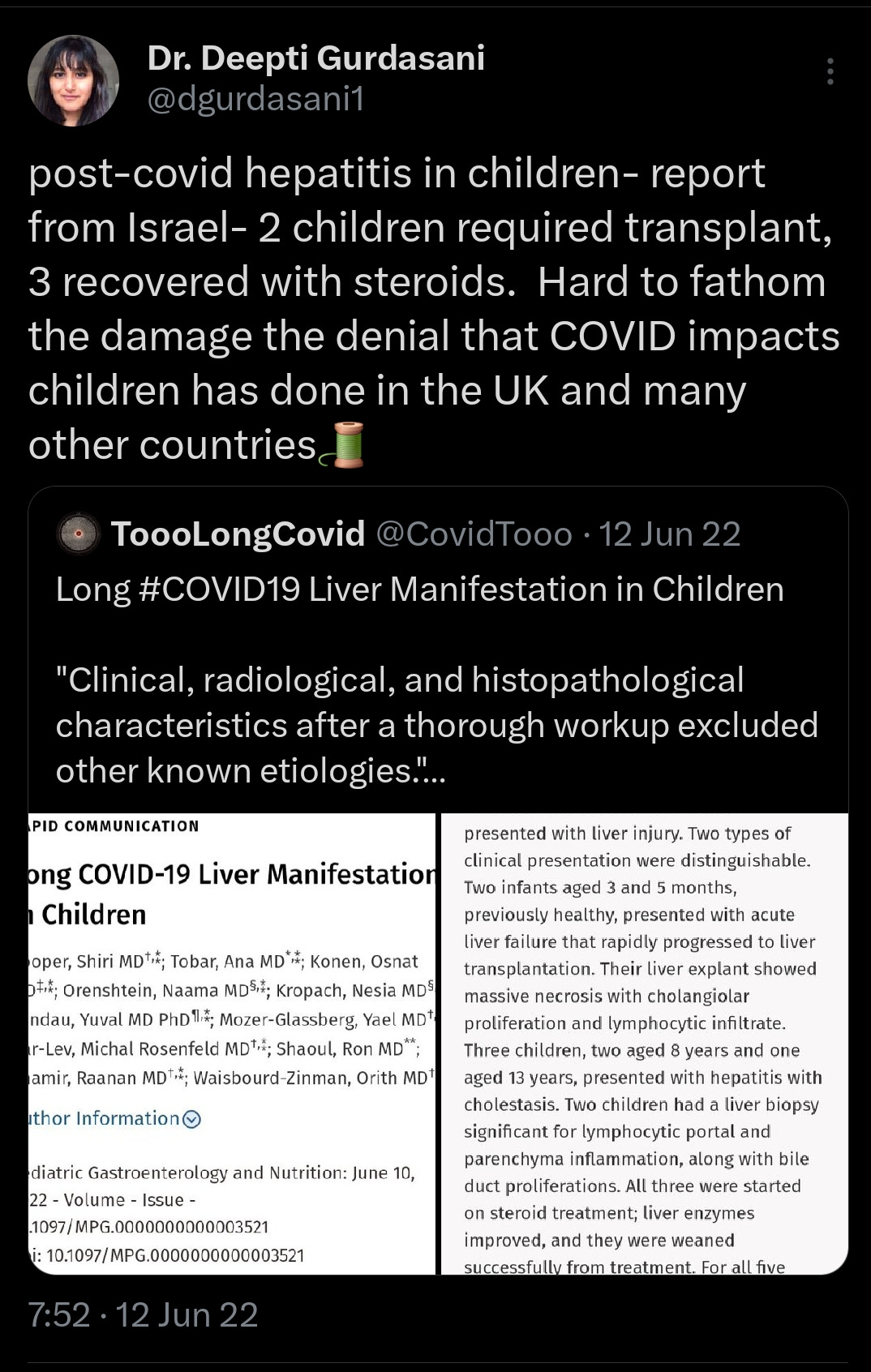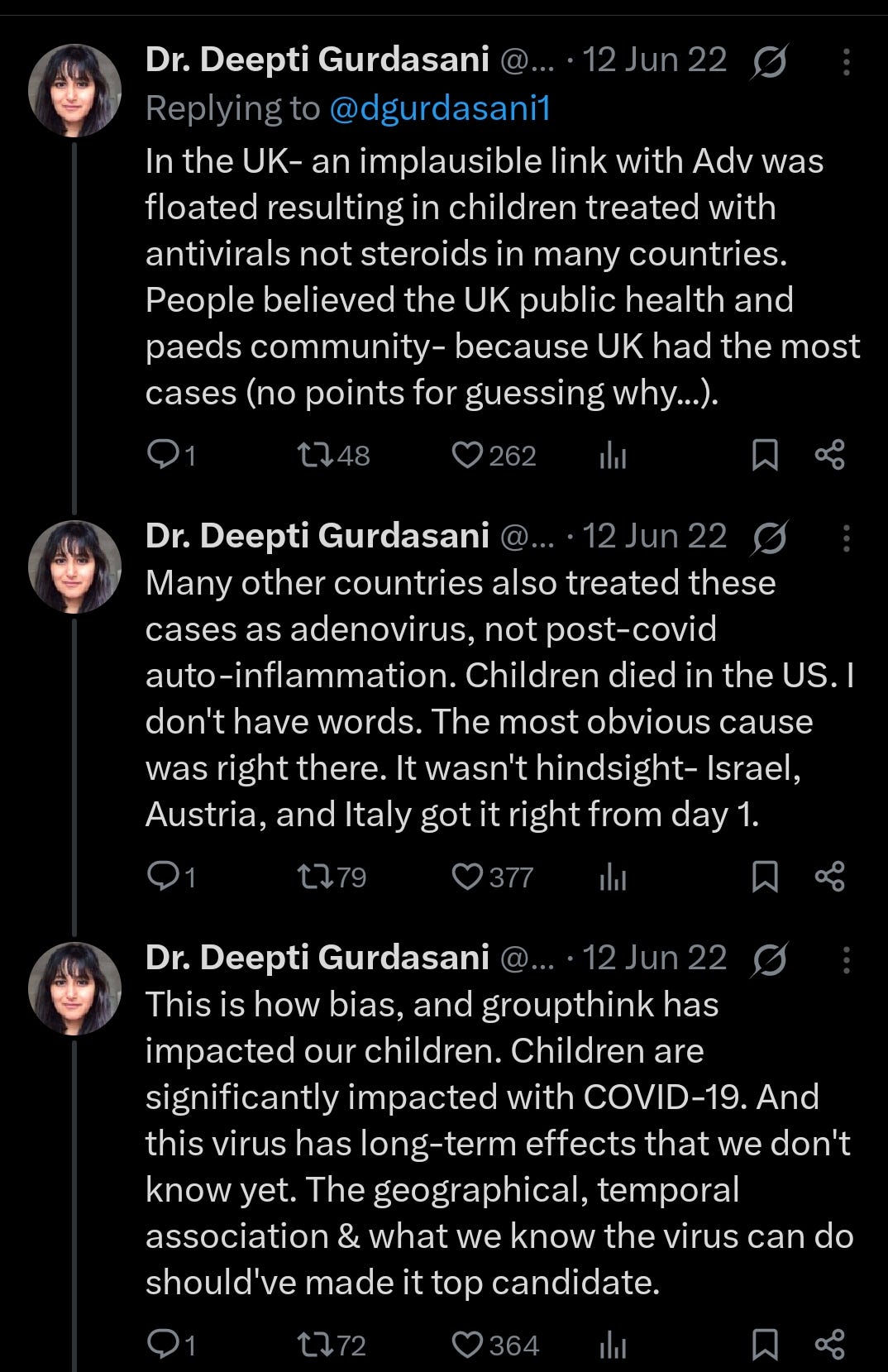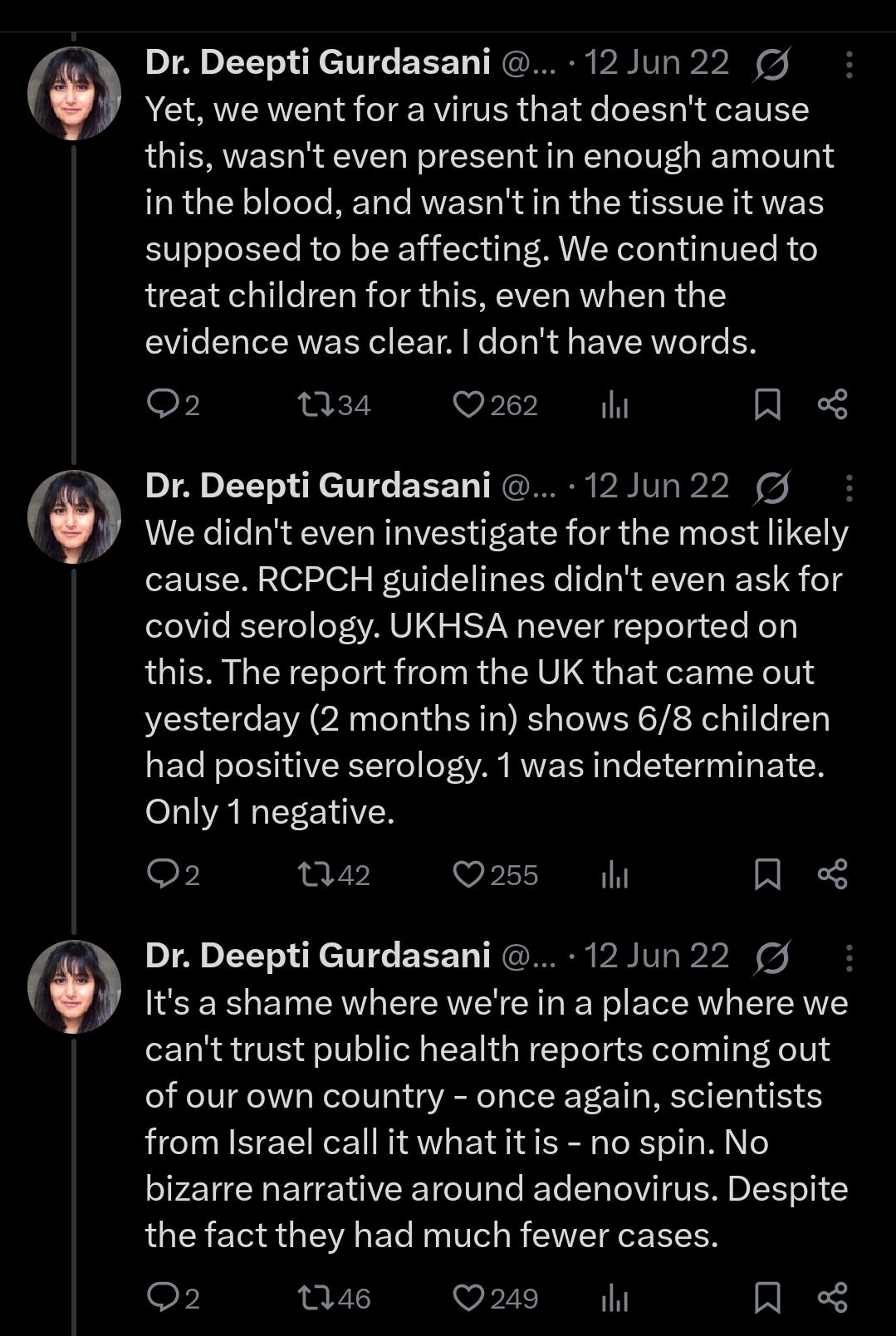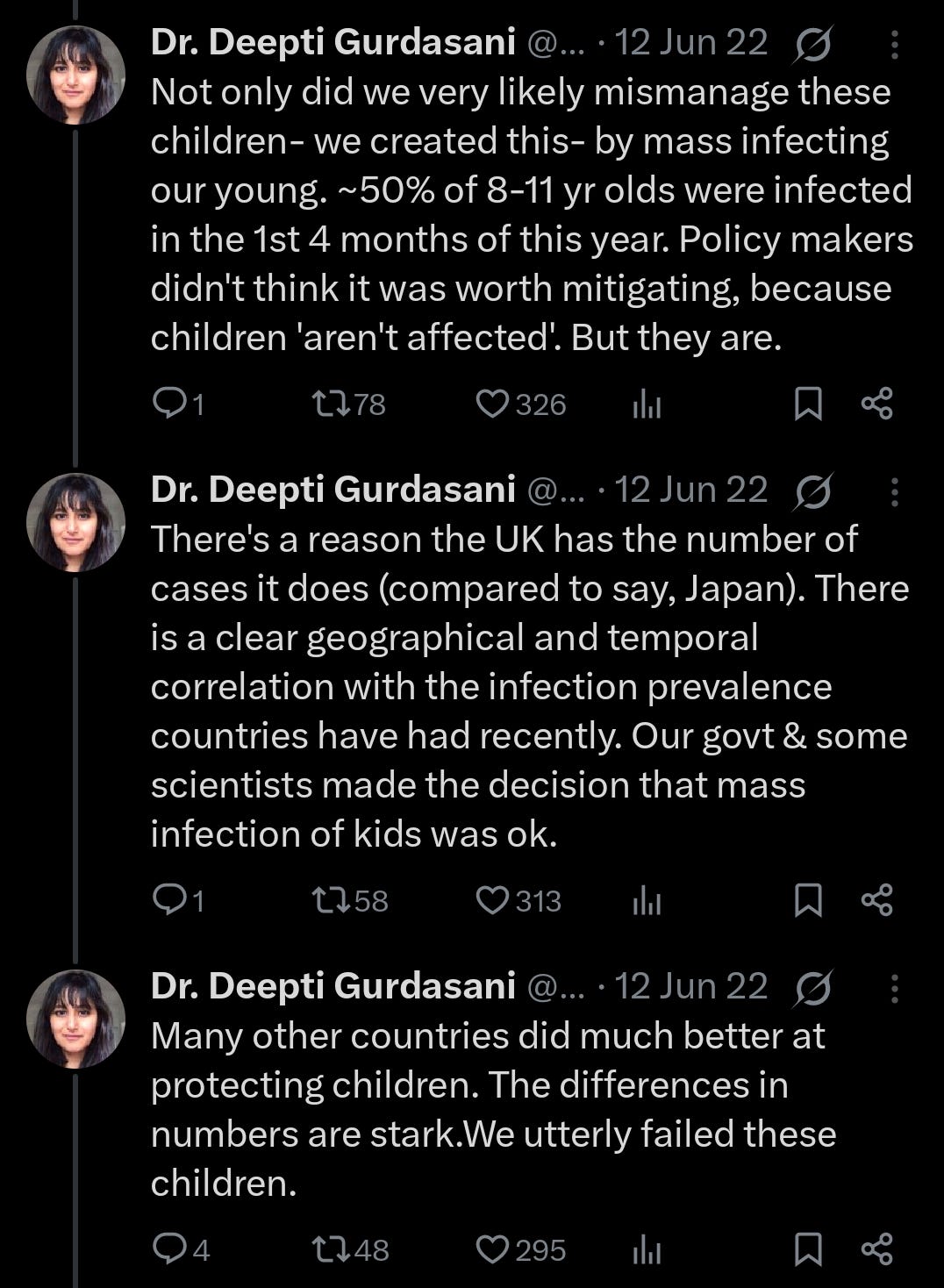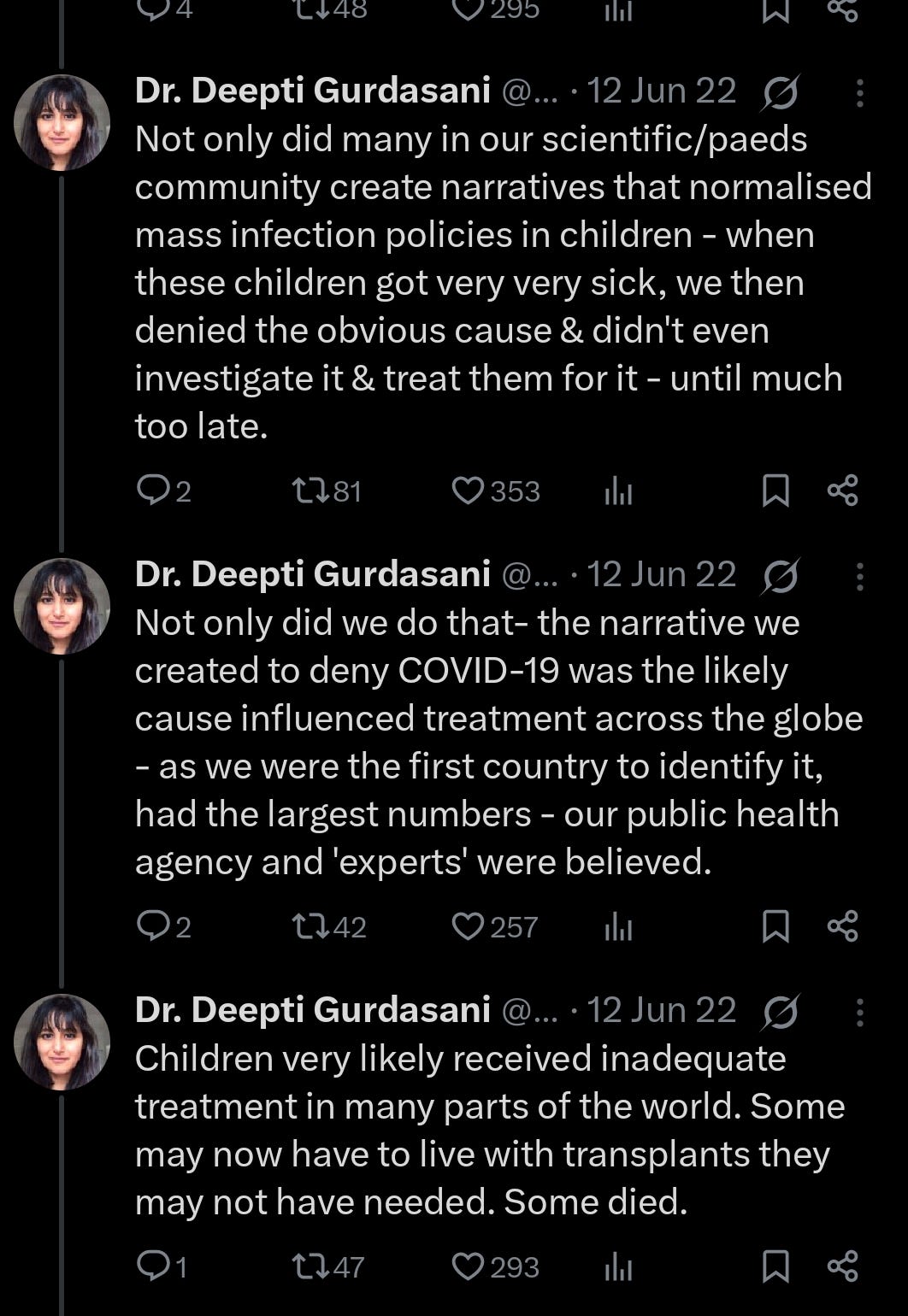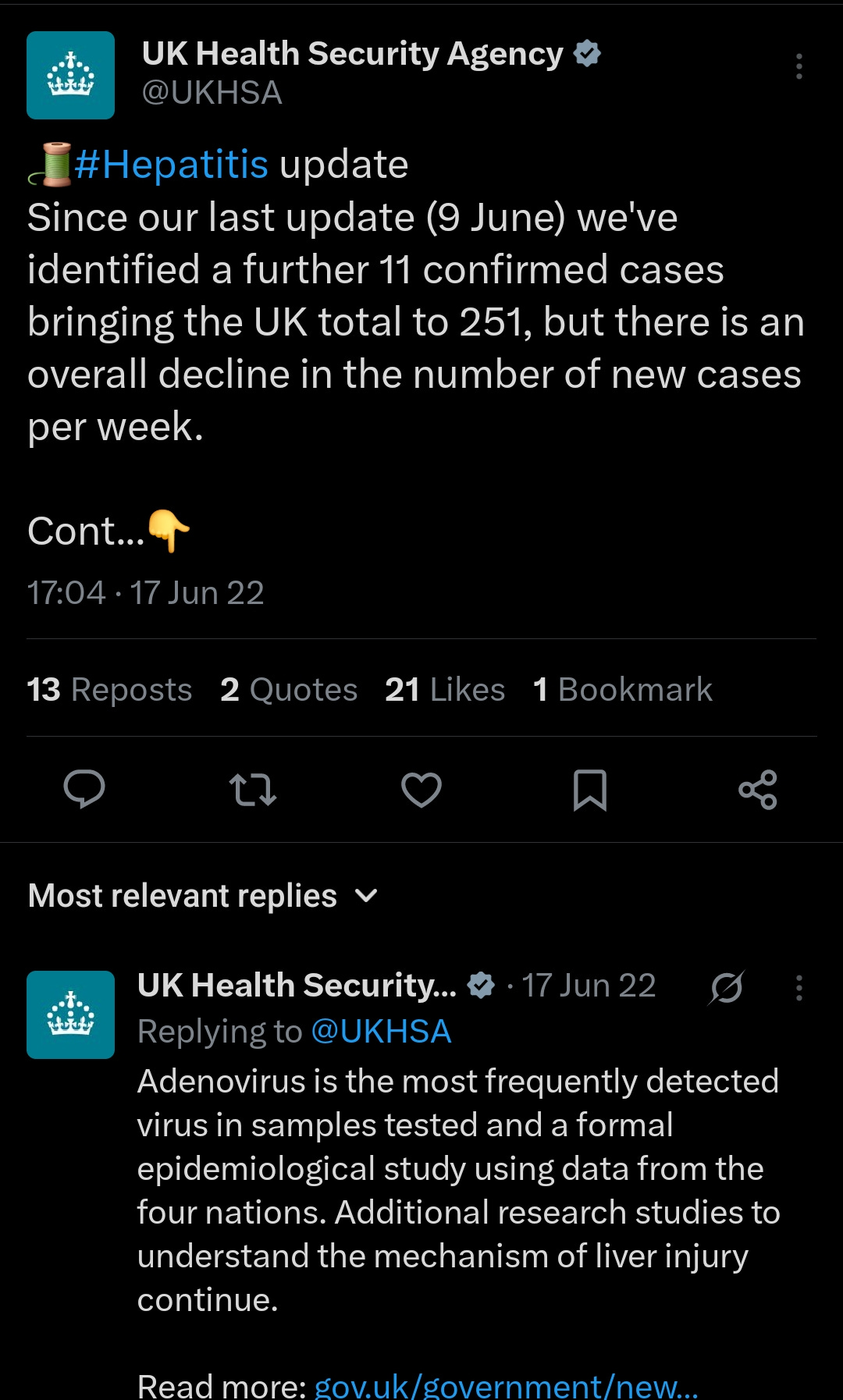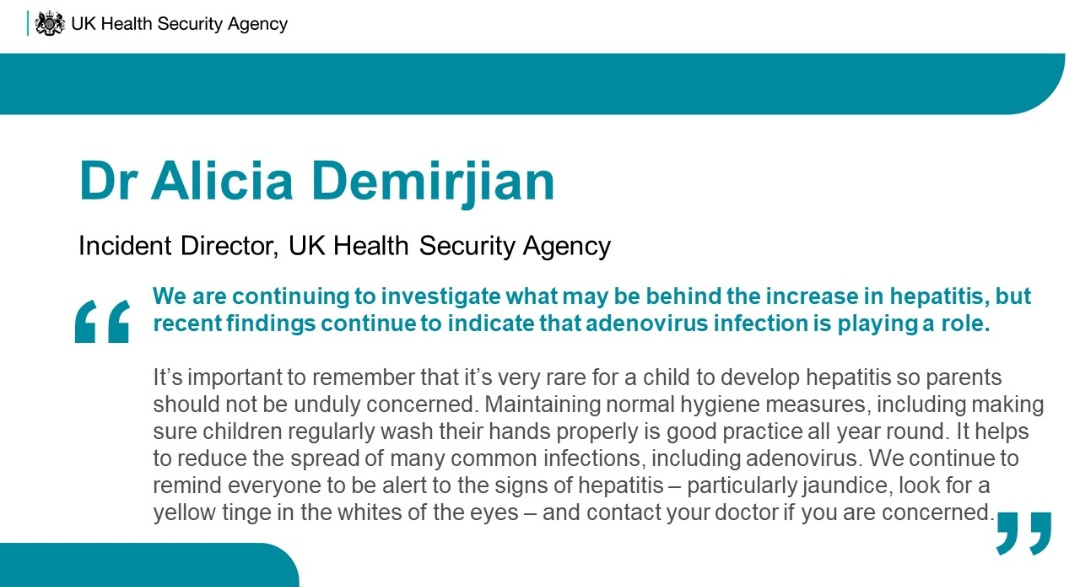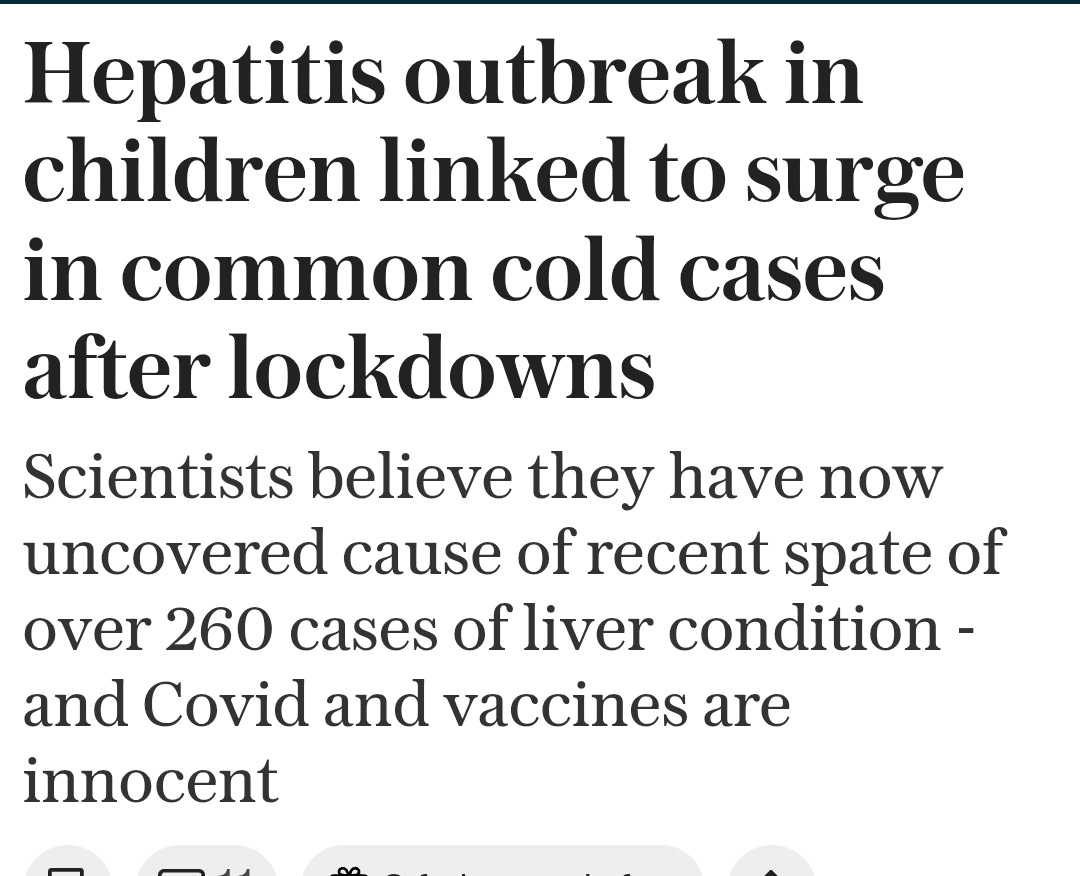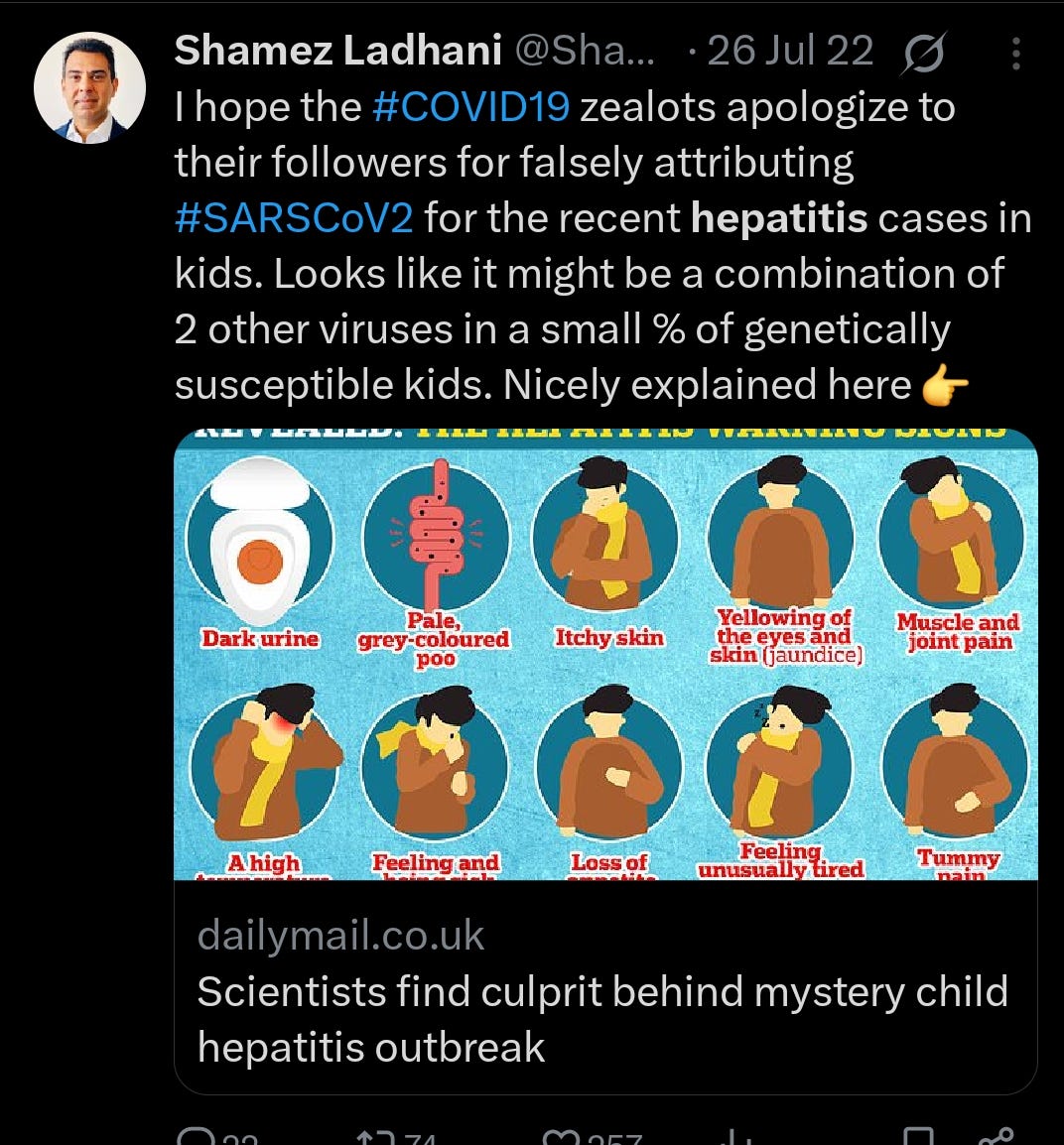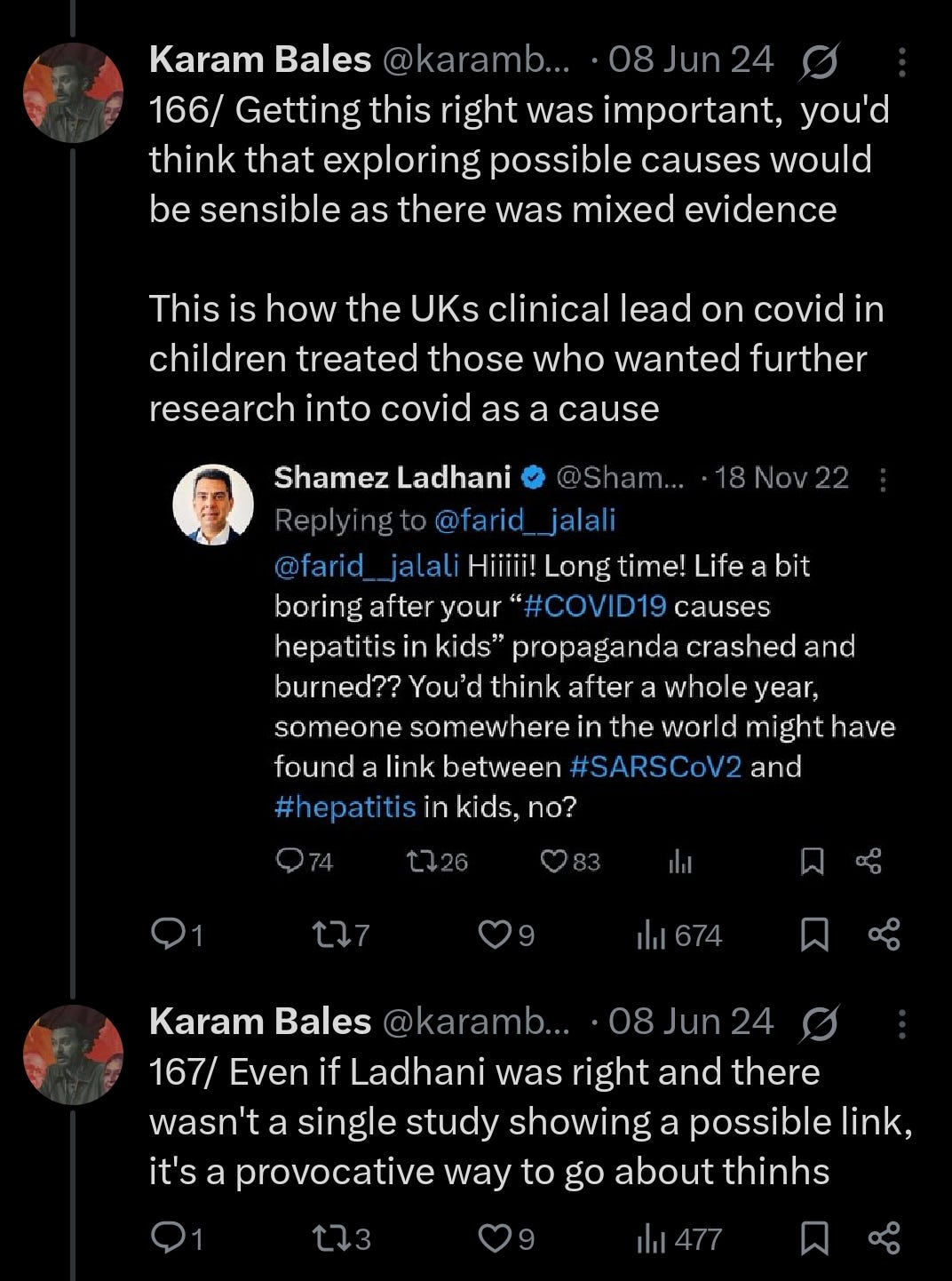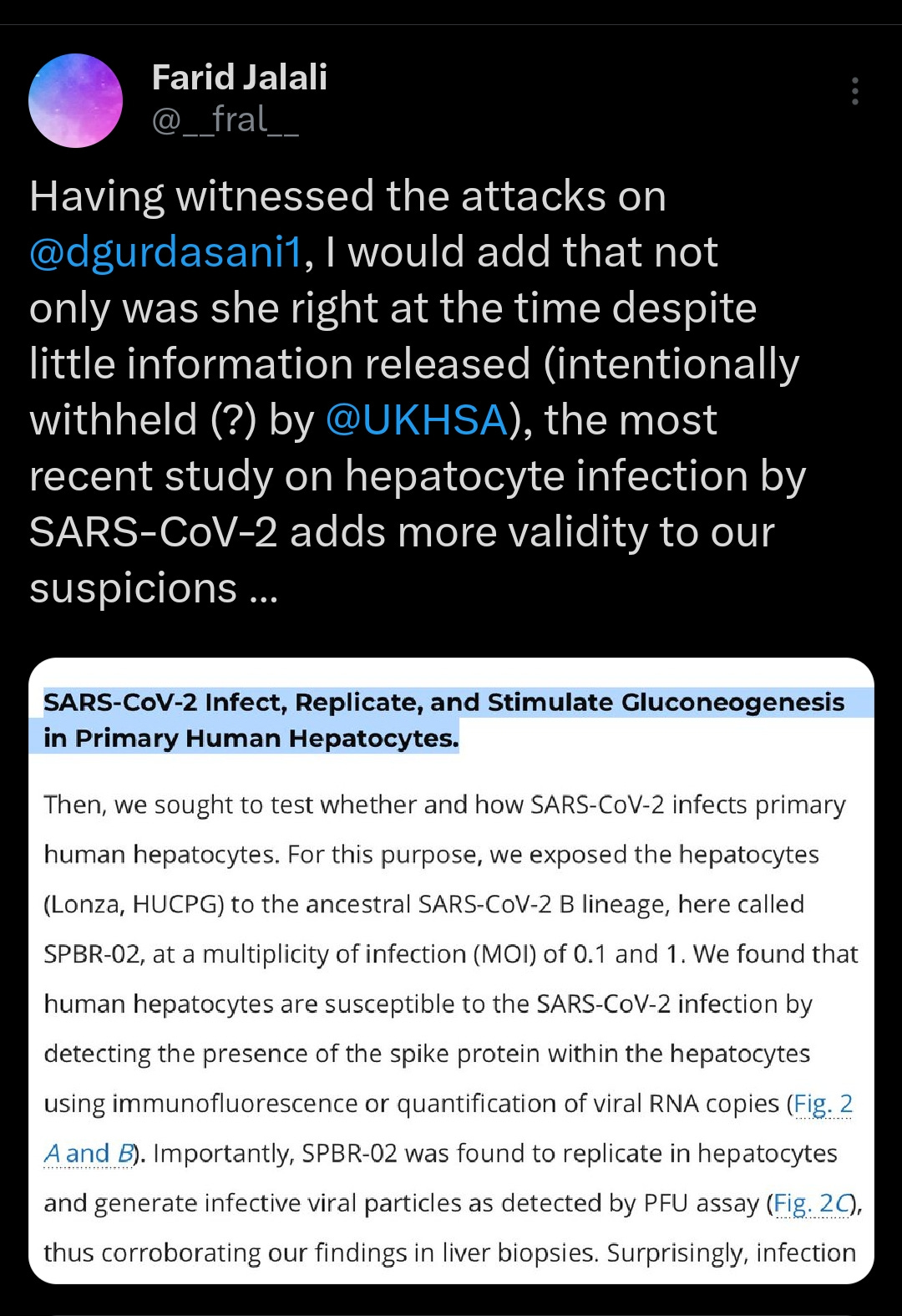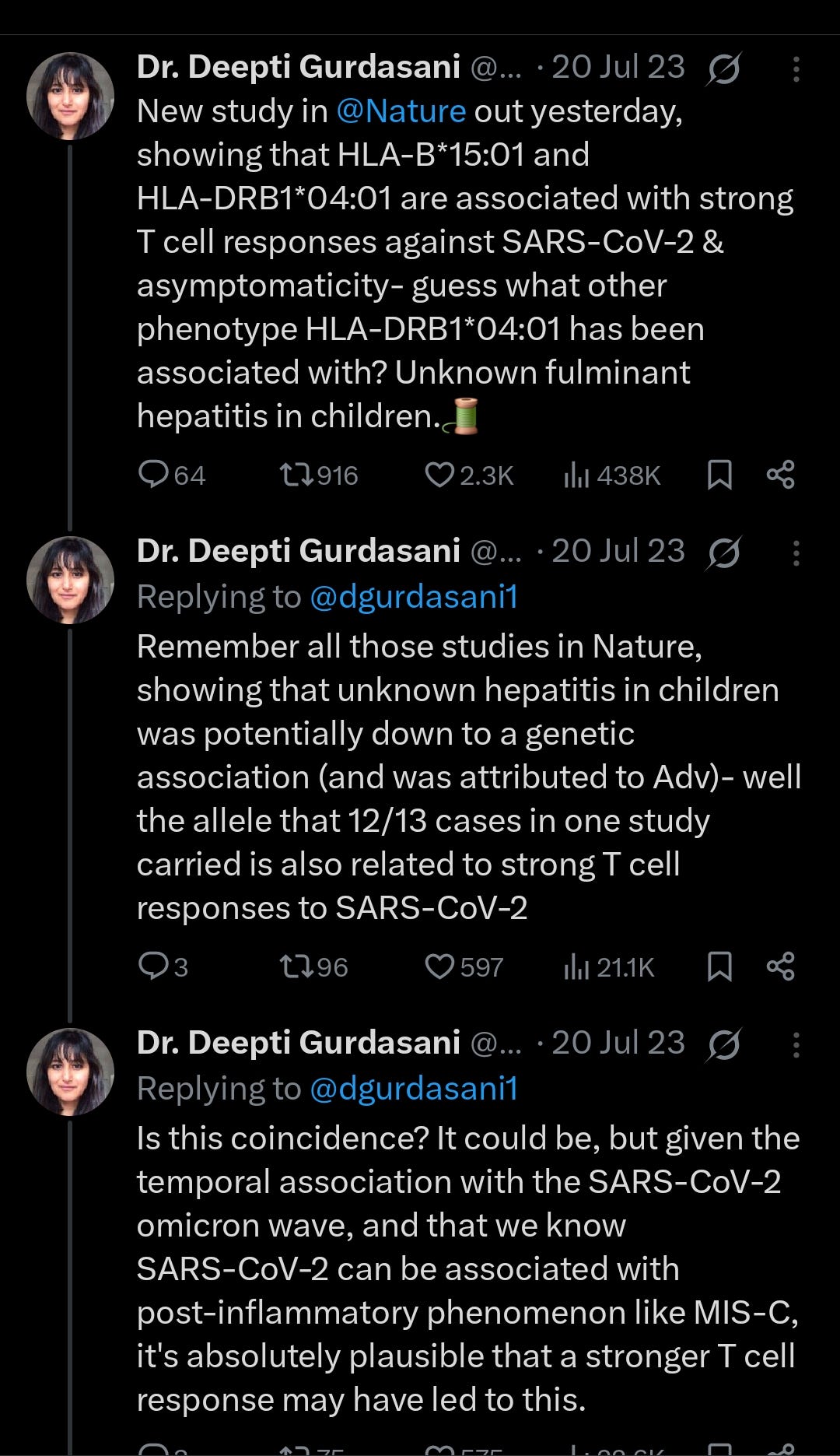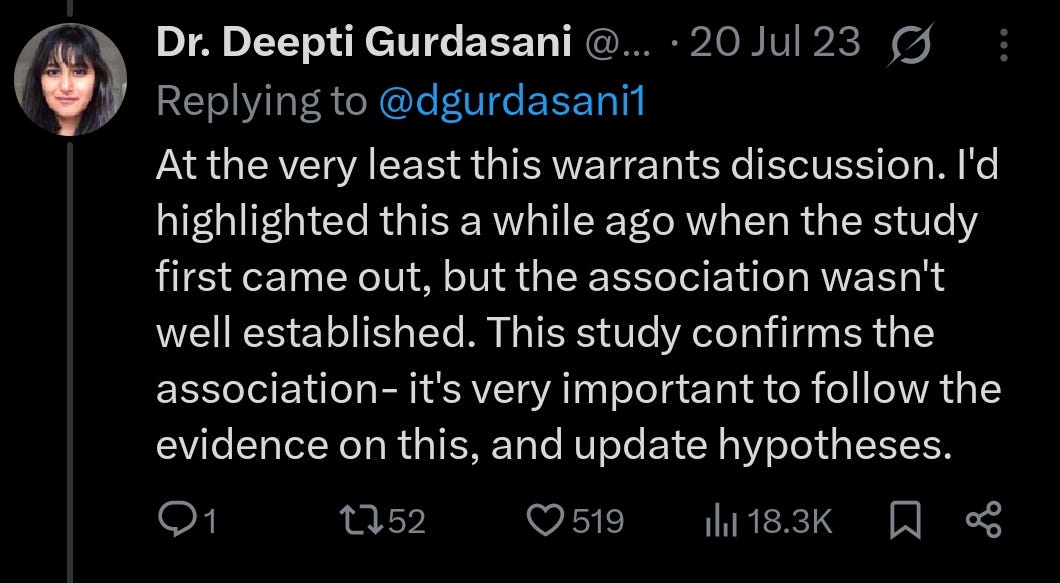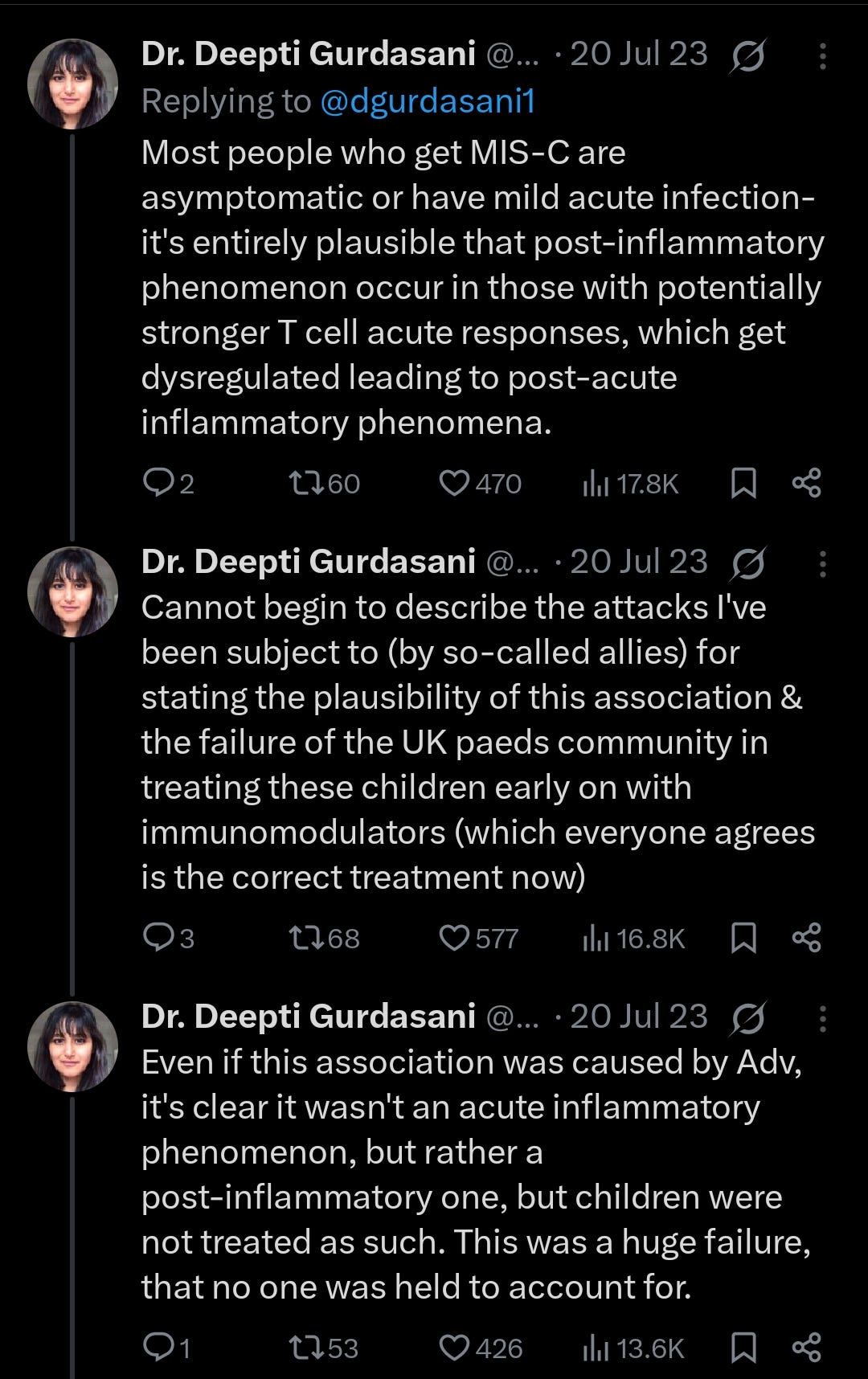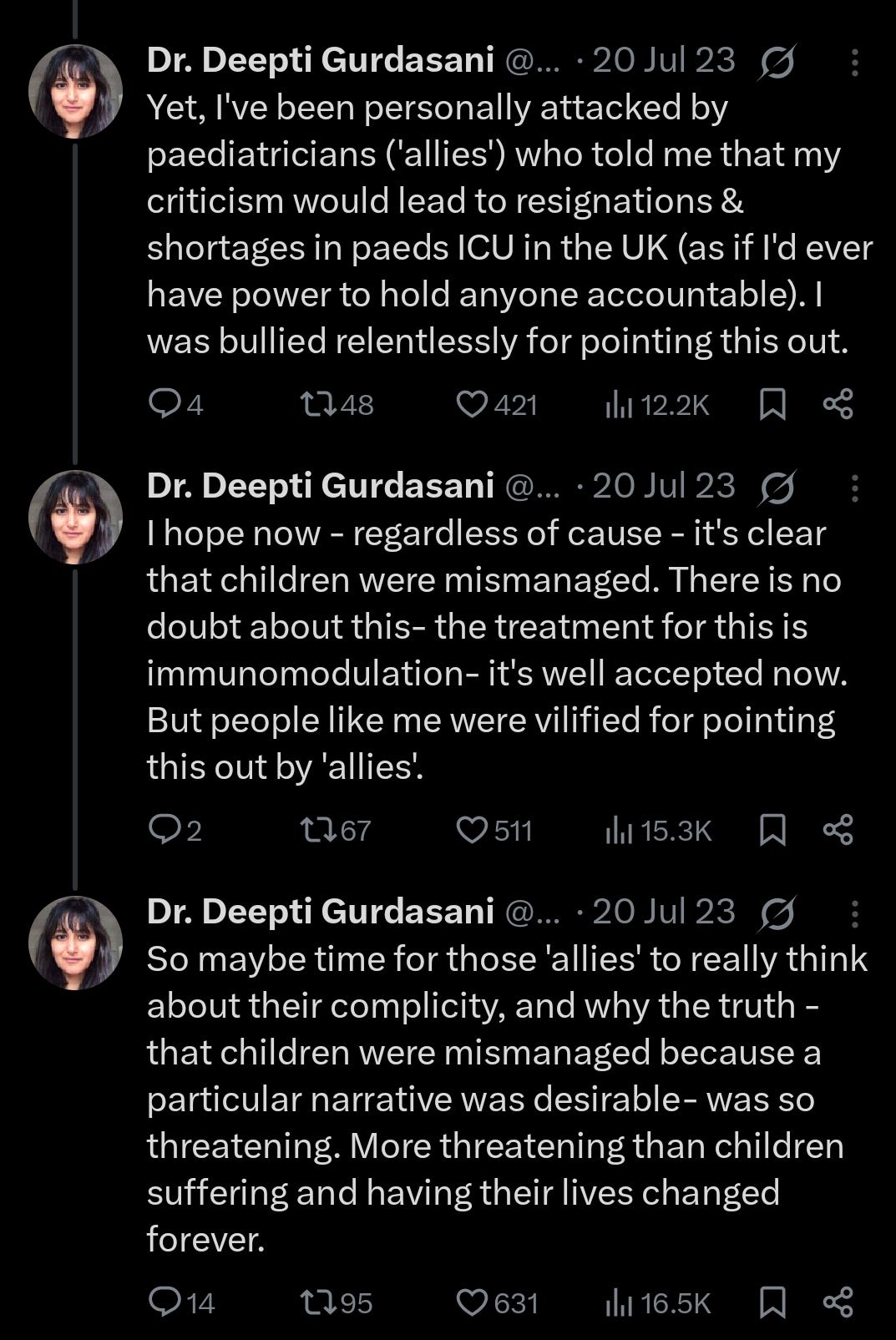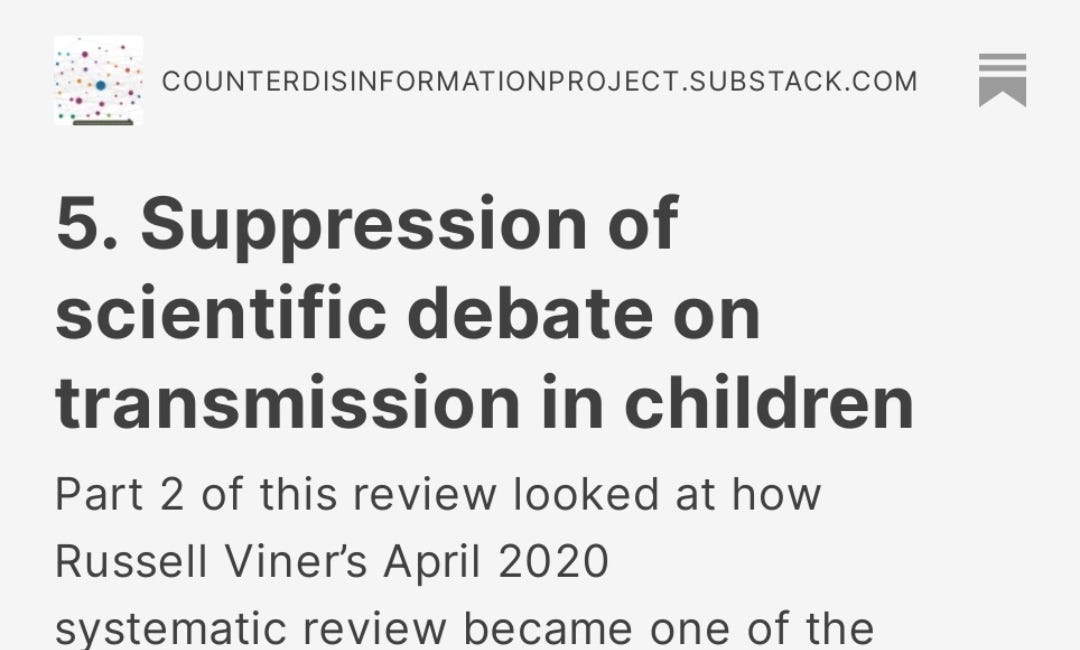Adenodogs? The 2022 Hepatitis Surge
Did UKHSA's focus on Adenovirus fail to properly investigate covid as the cause?
2022 Hepatitis surge
For a few months in 2022 the UK media was alarmed about a surge in children presenting with hepatitis of unknown cause in the UK and other countries. The numbers were relatively small compared to the harms already known to have been caused by covid; harms ignored by institutions and much of the media, but children died from these hepatitis cases and others had life changing transplants.
Like almost every aspect of the pandemic the cause of these cases became a divisive topic, the media mainly focused on lockdowns being a possible cause, while messaging from UK authorities focused on Adenovirus but didn't rule out covid, many of the experts holding senior positions or advising the government were more than dismissive of critics who didn't think they were properly exploring a covid link, they were personally insulting.
Three years later our knowledge of covid's impact on organs and the immune system has advanced. Since the UK Health Security Agency concluded that covid had no role in the hepatitis cases there is now an increasing body of evidence suggesting they called it wrong, and that children could have been given the wrong treatment. Considering at the covid inquiry the UKHSA's leadership wouldn't accept aerosols were the main form of transmission there seems little chance they will be revisiting this topic.
Warnings raised
On 6 April 2022 the UK Health Security Agency released a statement calling for vigilance regarding liver inflammation in children.
The investigation into the causes of this surge in hepatitis in children became a microcosm of the wider debate on covid in children, demonstrating the peculiar lack of curiosity and unprofessionalism of those working with the UK government.
On 10 April 2022 the UK reactivated its study into the clinical characterisation of covid. It's a telling sign of the UK's lack of curiosity that the study had already been discontinued.
Regarding media reporting of the hepatitis surge the Telegraph will be used as an example.
12 April
22 April
UKHSA Update
25 April the Telegraph decided to go with lockdown as the cause.
But also on 25 April the Telegraph published another article online which is more balanced than the front page of the newspaper.
Adenovirus was cited as the leading theory.
The pandemic was considered…
Note that the possibility that covid impacts the immune system was suggested by the interviewed expert, however the editors decided to focus on the idea of lockdowns causing immunity debt.
There is now considerable evidence showing that covid does impact the immune system; Yale has produced an in depth report on the subject, while the concept of immunity debt appeared in 2021 and hasn't been supported by real world data, Sweden has suffered similar spikes and surges in various diseases that have been blamed in the UK on lockdowns and immunity debt.
These articles came from the latest UKHSA update which cited Adenovirus as the most likely cause. Adenovirus is not associated with hepatitis, below are UKHSA's working hypotheses.
“Immunity debt” was considered the most likely cause, while this should seem an odd reason for Adenovirus to start attacking livers it should be noted that paedatricians working on much of the evidence base UKHSA relies on played an important role in promoting the concept of immunity debt.
Covid was in second and third place in the report but on social media this group of paediatricians and UKHSA individuals were quick to disparage those calling for more testing and research into covid as a possible cause.
Adenovirus?
One of the most determined epidemiologists criticising the way UKHSA was proceeding was Dr Deepti Gurdasani, she wasn't alone but for this piece we will follow her analysis, as she was one of those who faced the greatest backlash.
While the UKHSA was still officially considering covid, the focus of their efforts was on Adenovirus, those questioning Adenovirus were treated with distain.
Circling The Wagons
5 May
As you can see there was considerable defensiveness over the Adenovirus theory, threads and counter threads were produced for and against Adenovirus and Covid, but efforts to discount covid seemed to be trying to close down debate; behind the scenes this attitude extended into scientific research.
6 May, the possibility of Dogs being to blame was considered.
At least those asked for comment didn't support this theory.
Again covid or immunity debt were suggested.
13 May
Shamez Ladhani is the UK's clinical lead for covid in children, and authored a large portion of the UK’s evidence base. He is also on a WHO Tactical Advisory Group for covid in children and is the most cited paedatrician on covid in children.
He has consistently argued against there being significant transmission in schools and has been at the forefront of downplaying potential harms from covid.
15 May
UKHSA Third Technical Briefing
21 May, The third technical UKHSA briefing on acute paediatric hepatitis cases was suprised. Adenovirus was still the favourite, however covid was still mentioned under (c) and (d). Still no reports if hepatic tissue was analysed for signs of viral infiltration.
Criticism of the briefing’s findings.
23 May, Again while UKHSA was saying it wasn't discounting covid, it appears they weren't properly investigating the possibility.
12 June, The Hepatitis surge played out in much the same was as transmission in schools and long covid in children has.
17 June
Note the only specified measure for preventing infection is handwashing.
Final Report
On 25 July 2022 the Telegraph published its final piece on the subject.
26 July, Ladhani has a habit of trying to provoke his critics when he declares victories which often turn out to be premature.
Dr Antonia Ho, lead author for of the studies, said Covid lockdowns and restrictions led to 'much reduced circulation of seasonal viruses'.
An 'equilibrium' needs to be re-established now that youngsters are mixing in pre-pandemic ways, which has led to 'different types of circulation' of viruses, she said.
18 November 2022
“Covid zealots”, “propoganda”, Ladhani acts as those who professionals who disagreed with him had some form of self interest in finding a covid link. Of course having dismissed transmission in schools, argued against masks and vaccination for school children, and called for testing and isolation to be removed in schools, it could be said that Ladhani has skin in the game in regards to any links to covid causing harm in children.
Later Research
20 July 2023 Nature article
The study isn't a smoking gun, but this study and others are pointing the finger at a covid link, and other studies including the one quoted at the start of this article provide an explanation for the mechanisms for the hepatitis cases which couldn't be satisfactorily explained regarding how Adenovirus could be responsible.
Even if Adenovirus was responsible for the hepatitis surge, three years on there is now much more research showing how covid can harm the liver, in adults and children.
BMJ study questions evidence behind UK schools policy
A study published in the BMJ has accused the UK Government of failing to prioritised children, setting out the harms physical and educational harms of a laissez-faire attitude to allowing high transmission rates in younger age groups.
UK Inquiry: Long COVID Oversight Board 22/06/2021
A section from the minutes of the Long COVID Oversight Board meeting held on the 22/06/2021 which has been released by the UK's Covid Inquiry. For the first time we get a peak of the conversations informing the government.
5. Suppression of scientific debate on transmission in children
Part 2 of this review looked at how Russell Viner’s April 2020 systematic review became one of the key papers in 2020 that claimed children and schools didn’t play a significant role in the transmission of covid.
6. Who wrote the September 2020 schools guidance?
The UK Government failed to explain how the guidance for schools in June 2020 and September 2020 was written. In June the Government wasn’t following SAGE’s advice as the cabinet made changes to the roadmap that hadn’t been modelled by SAGE.
9. June - Oct 2020: UK influence on WHO Schools groups
Previous parts of this review of the evidence base behind the UK’s policy on covid in children and schools have examined how the few individuals who became the UK’s key paediatric advisers have sought to influence the evidence base and policy of other countries, for instance the US via email exchanges with Fauci to set up colloboration projects and with…




